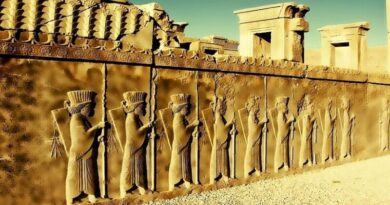
“Afterlife” in Biblical View – Part 2
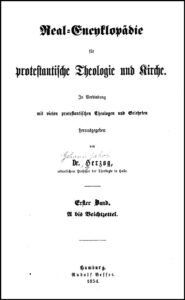
Realenzyklopädie für protestantische Theologie und Kirche (1853-1868). In English: The New Schaff-Herzog Encyclopedia of Religious Knowledge, 1908-1914:
6. Merits and Defects [in Plato’s philosophy]. … But a passing glance may be given to the radical defects and imperfections of Plato’s best teachings—his inadequate conception of the nature of sin as involuntary, the result of ignorance, a misfortune, and a disease in the soul, rather than a transgression of the divine law; his consequent erroneous ideas of its cure by successive transmigrations on earth, and protracted pains in purgatory, and by philosophy; his philosophy of the origin of evil, viz., in the refractory nature of matter, which must therefore be gotten rid of by bodily mortification, and by the death of the body without a resurrection, before the soul can arrive at its perfection; his utter inability to conceive of atonement, free forgiveness, regenerating grace, and salvation for the masses, a fortiori for the chief of sinners; the doubt and uncertainty of his best religious teachings, especially about the future life (“Apology,” 40 E, 42; Phædo, 107 C); and the utter want in his system of the grace, even more than of the truth, that have come to us by Jesus Christ, for, after all, Platonism is not so deficient in the wisdom of God as it is in the power of God unto salvation. The “Republic,” for example, proposes to overcome the selfishness of human nature by constitutions and laws and education, instead of a new heart and a new spirit, by community of goods and of wives, instead of loyalty and love to a divine-human person like Jesus Christ.
7. Later Platonic Schools. In the Middle and the New Academy, there was always more or less tendency to skepticism, growing out of the Platonic doctrine of the uncertainty of all human knowledge except that of “ideas.” The Neo-Platonists (see Neo-Platonism), on the other hand, inclined toward dogmatism, mysticism, asceticism, theosophy, and even thaumaturgy, thus developing seeds of error that lay in the teaching of their master. After the Christian era, among those who were more or less the followers of Plato, were, at one extreme, the devout and believing Plutarch the author of “Delay of the Deity in the Punishment of the Wicked,” and the practical and sagacious Galen, whose work on the “Uses of the Parts of the Human Body” is an anticipation of the Bridgewater Treatises, both of whom, as also Socrates, would have accepted Christianity if they had come within the scope of its influence; and, at the other extreme, Porphyry and the Emperor Julian, who wielded the weapons of philosophy in direct hostility to the religion of Christ; while intermediate between them the major part of the philosophers of the Neo-Platonic and eclectic schools who came in contact with Christianity went on their way in indifference, neglect, or contempt of the religion of the crucified Nazarene. But not a few of the followers of Plato discovered a kindred and congenial element in the eminent spirituality of the Christian doctrines and the lofty ethics of the Christian life, and, coming in through the vestibule of the Academy, became some of the most illustrious of the Fathers and Doctors of the early Church. And many of the early Christians, in turn, found peculiar attractions in the doctrines of Plato, and employed them as weapons for the defense and extension of Christianity, or cast the truths of Christianity in a Platonic mold. The doctrines of the Logos and the Trinity received their shape from Greek Fathers, who, if not trained in the schools, were much influenced, directly or indirectly, by the Platonic philosophy, particularly in its Jewish-Alexandrian form. That errors and corruptions crept into the Church from this source can not be denied. But from the same source it derived no small additions, both to its numbers and its strength. Among the most illustrious of the Fathers who were more or less Platonic, may be named Justin Martyr, Athenagoras, Theophilus, Irenæus, Hippolytus, Clement of Alexandria, Origen, Minutius Felix, Eusebius, Methodius, Basil the Great, Gregory of Nyssa, and St. Augustine. Plato was the divine philosopher of the earlier Christian centuries; in the Middle Ages Aristotle succeeded to his place. But in every period of the history of the Church, some of the brightest ornaments of literature, philosophy, and religion—such men as Anselm, Erasmus, Melanchthon, Jeremy Taylor, Ralph Cudworth, Henry More, Neander, and Tayler Lewis — have been “Platonizing” Christians.
– English edition, Vol. IX (1911), p. 91.

Jacob Blain, Death Not Life: Or The Destruction of the Wicked (Commonly Called Annihilation) Established, And Endless Misery Disproved, John P. Jewett & Co, Boston, MA, USA, 1854.
The other text to prove man was made immortal, or with an immortal soul, is Gen. 2:7, ” And the Lord God formed man of the dust of the ground, and breathed into his nostrils the breath of lives, (plural) ; and man became a living soul,” (creature, as the original signifies.) Note 11 Man was made of the dust” so if “breath” meant a soul or living entity, another part, that was not ” the man” for the man was “dust” — “dust thou art,” not “thy body is dust, as divines make it mean, by adding to what is written. But soul has become a great word in the 19th century. Let us see what it meant in ‘ Bible times. In this text it is said, ” And man became a (nephesh chayiah) a living soul.” Gen. 1 : 24 reads, “Let the earth bring forth the (nephuh chayiah) living creature after his kind, cattle and creeping things.” Gen. 2:19, ” The Lord formed every beast… and brought them unto Adam….and whatsoever Adam called every (nephesh chayiah) living creature, that was the name thereof.” Gen. 6:19, ” And of every (nephesh chayiah) living thing of all flesh….shalt thou bring into the ark to keep them alive with thee.” — Here and in more than twenty other places, the same words translated “living soul” are applied to beasts; but the translators have them living creature or thing, &c. Chayiah, is living, so man became a ” living creature” or living soul; and if this means an immortal soul, then all beasts and creeping things have such. Thus we see the unlearned are kept in ignorance by deceitful translators, and the learned expounders keep up the deception, and will not make “the vision plain.”
(4.) The Greek word psuche has the same meaning as nephesh in Hebrew; and Parkhurst’s first sense of it is, “breath, animal life, a living animal that lives by breathing,” &c. It is used 105 times in the N. T., and translated soul fifty-nine times, and life forty; also, mind, us, heart, and twice applied to beasts. Rev. 8:9; 16:3.
The deception in translating it soul instead of life is seen plainly in Mat. 16:25-26, and Mark 8 : 36-37, where it is rendered four times life and four times soul. V. 25 is “for whosoever will save his life (psuche) shall lose it.” V. 26, ” For what is a man profitted if he shall gain the whole world and lose his own soul (psuche)? The learned tell the people that psuche (life) in v. 25 means literal life, and we should lose it, if need be, in persecutions: but in v. 26, they say, the same word, psuche {life), means an immortal soul which cannot lose life, or die. But they are careful not to tell them the original words are the same.
Had psuche been rightly rendered in these texts, no one would have thought of going to them to prove that men have immortal souls to lose in the world to come. They will have resurrected lives to lose there; and Christ says, positively, that those who will not bear persecution for his sake shall lose them there.
– pp. 31, 33.

Observations on 1st. The Chronology of Scripture. 2d. Strictures on the Age of Reason. 3d. The evidence which reason, unassisted by revelation, affords us with respect to the nature and properties of the Soul of Man. 4th. Argument in support of the opinion that the Soul is inactive and unconscious from death to the resurrection, derived from Scripture, New York, USA, 1795.
– Anonymous Work, Quoted in Catalogue of Books and Pamphlets Principally Relating to America, Edward P. Boon, New York, USA, 1870, p. 75.
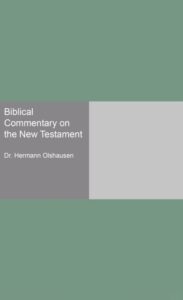
Hermann Olshausen Biblical Commentary on the New Testament, Sheldon & Company Publishers, 1861:
“If, therefore, there were no resurrection, and consequently no kingdom of God, no restoration of Paradise, the Christians sacrificing everything in this life in order to gain all in the next, were the most miserable of men. But Christ being security for our resurrection, the first-fruits only of those who slept, the resurrection had commenced with him. Billroth justly remarks that απαρχη των κεκοιμημενων is not to be taken as a simple apposition to Christ, but as the predicate of the whole sentence: Christ arose as first-fruits, i. e., in order to be the first-fruits. Regarded from our modern point of view the idea is startling; it would seem that the apostle might be answered: if the body is not raised, assuredly the spirit of man may yet continue to exist; and for him it is not indifferent whether the life of the man has been one of stern self-denial, or self-indulgence. But the apostle by no means recognizes the possibility of existence as a pure spirit without bodily organs; the doctrine of the immortality of the soul and the name are alike unknown to the entire Bible; and indeed with justice, because a personal consciousness in created beings necessarily presupposes the limitations of body.* The modern doctrine of immortality is not materially different from the supposition that the soul flows back, like a drop into the great sea of universal life. It is indeed in apparent contradiction to our doctrine that, even according to the Bible view, the soul is to be regarded as existing independently in the interval between death and the resurrection. But first, consciousness in this state, at least with many, can be regarded only as a sort of twilight, for which reason the dead are called κεκοιμημενων, sleeping, without, however, our being required to assume in this case an absolute unconsciousness, as did the ψυχοπαnnύcioi (psychopannychites); secondly, it is to be supposed that a certain relation is always maintained between the elements of the body and the separated soul, intimate in proportion to the sanctification of the organ which had invested the soul on earth.”
* See Usteri’s remark in the Paul Lehrbegr., p. 365, and the passage there quoted from Athenagoras de Resurrect, c. 25.
– Vol. 4, 1861, p. 381.
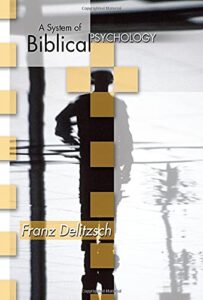
Franz Delitzsch, System der biblischen Psychologie, Leipzig, Germany: Dorffling & Franke, 1861 (In English: A System of Biblical Psychology, Edinburgh: T&T Clark, 1869. This cover is from 2003 edition):
Where Scripture speaks of death as of a κρίμα [sentence, penalty] common to men (Ecclus. xli. 4), it is everywhere the whole man who suffers it. Death is a breaking up of the divinely ordained substance of a living being. In this disruption — the issue of the Turba, which has laid hold of body, soul, and spirit, each according to its manner (Div. III. Sec. II.) — body, soul, and spirit also share, each in its own way. Body and spirit fall away from one another; and the spirit, to which the soul has retreated, finds itself, so far as it is disembodied, in the condition of death. Even of the spirits of the just made perfect this is the case, although it is said only per zeugma. Scripture calls the deceased altogether, not merely their bodies, νεκροι [dead]; and teaches that the dead, not merely that their bodies, rise again, for the resurrection is a restoration of the personal condition that is dissolved by death.
Death is consequently the final destiny of the whole man. How then is it possible, apart from redemption, to speak of the immortality of man, or even only of the immortality of his soul? If we understand, by immortality of the soul, its indissolubility as the result of its simple nature, the expression does not affirm what we have in view. For that that which is not compounded cannot be dissolved, is self-evident; but is everything which cannot perish in the way of dissolution, therefore of necessity eternal?
Even if we understand, by the immortality of the soul and the spirit, their incapability of annihilation, the expression is, to say the least, unscriptural. For death and annihilation in Scripture are not by any means coincident ideas. In general, Scripture nowhere says that anything whatever of what has been created is annihilated ; and, so far as our inquiry reaches, we see no atom perish. But, from the nature of things, it by no means follows, that God’s word of might cannot again transplant into nonentity that which it has called into existence. And if such a conclusion followed from the nature of the soul, still actual continuance of being and self-conscious continuance of being are far from being necessarily associated. Whence can it be concluded that human souls continue to subsist individually, since the souls of the brutes are confessedly taken back into the entire spirit of nature, of which they are individuations? That which is constituted by way of emanation may also be taken back by way of remanation (Ps. civ. 29; Job xxxiv. 14).
– pp. 474, 475.
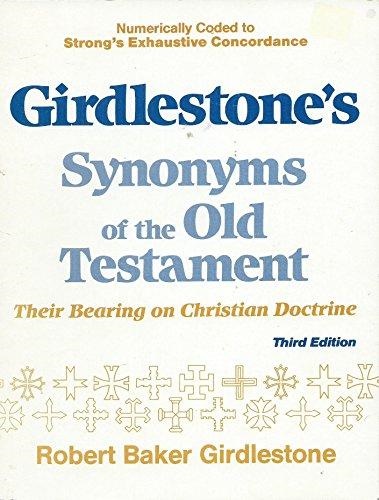
Synonyms of the Old Testament, Robert Baker Girdlestone, Longmans, Green and Co., London, 1871. (This cover is from 1983 edition):
“When the writer of the Epistle to the Hebrews says that the word of God pierces ‘to the dividing asunder of soul and spirit’ (Heb. 4.12), and when St. Paul prays that the ‘body, soul, and spirit’ of his converts may be preserved blameless (1 Thess. 5. 23), a psychological division of the immaterial part of human nature is drawn which is exactly similar to what we find running through the whole Old Testament. The Bible proceeds upon the supposition that there are two kinds of existence, which, for the convenience of the moment, may be called mind and matter; it appears to teach that matter originally proceeded from mind, not vice versa; it tells us that the key to the mystery of the universe is to be found, not in the material substance of which it is composed, nor in the agents or influences which cause the phenomena of nature to follow one another in regular sequence, and which give rise to what we call Laws of Nature, but to a Master-mind, who plans all things by His wisdom, and sustains them by His power. The Scriptures bring the immaterial world very close to every one of us; and whilst we are all only too conscious of our relation to things fleeting and physical, the Sacred Record reminds us on every page that we are the offspring of the absolute and unchanging Source of all existence. A man is sometimes tempted to say, ‘I will believe only what I see’; but the first puff of wind or the first shock of electricity tells him that he must enlarge his creed. If he still stops short by asserting his faith only in the forces which affect matter, he will find himself confronted by the fact that the matter which composes the human frame becomes by that very circumstance subject to forces and influences to which all other matter is a stranger. He finds a world within as well as a world without, and he is compelled to acknowledge that his physical frame is the tenement of a super-physical existent being which he calls self, and which is on the one hand a recipient of knowledge and feeling obtained through the instrumentality of the body, and on the other hand an agent, originating and, as it were, generating a force which tells upon the outer world, and enables him to play a part in existence.
It is in respect to this inner life and its workings that man is the child of God. His structure is of soil, earth-born, allied with all physical existence, and subjected to the laws of light, heat, electricity, gravitation, and such like, as much as if it were so many atoms of vegetable or mineral matter. But the immaterial existence which permeates that structure, investing it with consciousness, flooding it with sensibilities, illuminating it with understanding, enabling it to plan, to forecast, to will, to rule, to make laws, to sympathise, to love, – this ego, this pulse of existence, this nucleus of feeling and thought and action, is a sunbeam from heaven, a denizen of an immaterial sphere of being, ordained by God its Father to live and grow and be developed within the tabernacle of flesh.
The Hebrew equivalent for the word ‘soul’ is Nephesh (נֶפֶש), which answers to ψυχή in the Greek. The cognate verb Naphash, to refresh, is found in Exodus 23.12, 31.17, and 2 Sam. 16.14. Nepheshhas various shades of meaning and of rendering, which must be gathered as far as possible under one or two heads. The soul is, properly speaking, the animating principle of the body; and is the common property of man and beast. Thus, in Lev. 24.18, we read, ‘He that killeth a beast shall make it good; beast for beast’; this is literally, ‘He that smiteth the soul of a beast shall recompense it; soul for soul.’ It is also used with respect to the lower animals in Gen. 1:21, 24; 2.19, 9.10, 12, 15, 16, and Lev. 11.46; in theses passages it has been rendered creature.
In some passages in the Pentateuch nepheshhasbeen rendered ‘anyone’; the word is thus used in an indefinite sense, the soul representing the person, as when we speak of a city containing so many thousand ‘souls.’ Perhaps, however, we should do wrong if we were to attribute an indefinite sense to the word in Scripture. The following are instances which may enable us to decide the point: – Lev. 2.1, ‘When any (lit. ‘a soul’) will offer a meat offering’; Lev. 24.17, ‘He that killeth any man,’ lit. ‘that smiteth any soul of man’ – the soul representing the life; Nu. 19:11, ‘He that toucheth the dead body of any man shall be unclean seven days,’ lit. ‘he that toucheth the dead (part) of any soul of a man (Adam) shall be unclean seven days’; verse 13, ‘Whosoever toucheth the dead body of any man that is dead,’ lit. ‘the dead (part) of a soul of a man that has died,’ ‘and purifieth not himself defileth the tabernacle of the Lord’; 31.19, ‘Whosoever hath killed any person,’ lit. ‘whosoever hath slain a soul’; see also Nu. 35. 11, 15, 30. In all these passages a dead body is regarded as that which ought properly to be animated by the soul, but owing to the law whereby man has to return to the dust, the spectacle is seen of a soulless body, and therefore of an object which (as representing sin) is to be regarded as ceremonially unclean.
This idea is borne out by other passages where contact with the dead is referred to. Thus, Lev. 21.11, ‘Neither shall he go in to any dead body,’ is literally, ‘neither shall he go in to a dead soul’; so Num. 6:6, ‘He shall come at no dead soul’; see also chap. 9.6, 7, 10, where ‘dead body’ is literally ‘soul,’ the idea of death being understood from the context. The same is the case in Nu. 5.2, ‘Whosoever is defiled by the dead,’ lit. ‘by the soul’; and 6.11, ‘He hath sinned by the dead,’ lit. ‘with respect to the soul.’
In Psalms 17.9, ‘deadly enemies’ are literally ‘enemies of my soul or life.’ In Job 11.20, ‘the giving up of the ghost’ is ‘the puffing forth of the soul.’ So also in Jer. 15.9, the literal rendering is ‘she hath puffed forth the soul.’
The soul is thus the source of animation to the body; in other words, it is the life, whether of man or beast. Accordingly, Nephesh is rendered ‘life’ in Gen. 19.17, 19, where we read of Lot’s life being saved; Gen. 32.30, ‘I have seen God face to face, and my life is preserved’; Gen. 44.30, ‘His life is bound up in the lad’s life’; Ex. 21.23, ‘Thou shalt give life for life’; verse 30, ‘He shall give for the ransom of his life whatsoever is laid up on him.’
In Deut. 24.7, we read, ‘If a man be found stealing any (lit. ‘a soul’) of his brethren,’ &c.; so in Ez. 27.13, ‘They traded the persons (lit. ‘the souls’) of men.’ By the use of the word Nepheshhere the wickedness of treating men as goods and chattels to be bought and sold is practically reprobated. This doubtless is the crime referred to in Revelation 18:13. Too much stress, however, must not be laid upon the fact that the soul is mentioned in these places. Perhaps the word ‘person’ in the sense in which we speak of an offence against a man’s person, or of a personal injury, is the real meaning in such passages. This rendering is adopted in Gen. 14.21; Lev. 27.2 (where both men and beasts are referred to); Nu. 5.6, 19.18, and Ez. 16.5 (where perhaps ‘soul’ would be better). A similar rendering is self, which is found in Lev. 11.43, ‘Ye shall not make yourselves (lit. ‘your souls’) abominable, neither shall ye make yourselves unclean’; 1 Kin. 19.4, ‘He requested for himself (or with respect to his soul) that he might die.’ It is used figuratively in this sense in Is. 5.14, ‘Therefore hell hath enlarged herself’ (lit. ‘her soul’).
The emphasis laid on the word soul in Gen. 27.31, &c., ‘that thy soul may bless me.’ Is remarkable, and perhaps may be explained in accordance with the passages last referred to. The blessing, though it came out of the mouth proceeded from the living man, – from his personal self.
In Hebrew, as in most other languages, the shedding of a man’s blood was a phrase used to represent the taking of his life, for ‘the blood is the life.’ in this oft-repeated phrase (e.g. Lev. 17.11,14) we see that the blood is (i.e. represents) ‘the soul’; and if the one flows out from the body, the other passes away too. In Prov. 28:17, we read lit. ‘The man that doeth violence to the blood of a soul shall flee into the pit’; so in Ez. 33:6, ‘If the sword come and take away a soul (Authorized Version, ‘person’) from among them… his blood will I require at the watchman’s hands’; Jonah 1:14, ‘Let us not perish for this man’s life, and lay not upon us innocent blood.’
This mystical identification of the blood and the life is of great interest as bearing up on the atoning work of Christ. We are told that He poured out his soul unto death, and that He shed his blood for the remission of sins. Evidently the shedding of the blood was the outward and visible sign of the severance of the soul from the body in death; and this severance effected as a voluntary sacrifice by the Divine Son, in accordance with his Father’s will, was the means of putting away sin.
But the Nephesh or soul is something more than the bare animating principle of the body; at least, if it is regarded in this light, a large view must be taken of that mysterious organisation which we call the body, and it must include the appetites and desires. The word is rendered ‘appetite’ in Prov. 23.2, and Ecc. 6.7. Compare the words of Israel, ‘our soul loatheth this light food’, Num. 21.5. Other passages in which a similar idea is presented are as follows: –
Ecc. 6.9, ‘Better is the sight of the eyes than the wandering of the desire’ (lit. ‘the soul’). Isaiah 56.11, ‘Greedy dogs’ (lit. ‘dogs strong of soul and appetite’). Hab. 2.5, ‘Who enlargeth his desire as hell, an cannot be satisfied.’ Micah 7.3, ‘He uttereth his mischievous desire.’ Jer. 22.27,44.14, ‘The land to which they desire to return.’ Jud. 18.25, ‘Angry fellows’ (lit. ‘bitter of soul’). 1 Sam. 22.2, ‘Discontented’ (lit. ‘bitter of soul’). Exod. 15.9, ‘My lust (i.e. soul) shall be satisfied upon them.’ Ps. 78.18, ‘They tempted God in their heart by asking meat for their lust.’ Ps. 105.22, ‘To bind his princes at his pleasure.’ Deut. 23.24, ‘Thou mayest eat grapes thy fill at thine own pleasure.’ Deut. 21.14, ‘Thou shalt let her go whither she will.’ Ps. 27.12, 41.1, ‘Deliver me not over unto the will of mine enemies.’ Ez. 16.27, ‘I have delivered thee unto the will of them that hate thee.’
Nephesh is also rendered mind and heart in several places where these words are used in the sense of desire and inclination. Thus, Gen. 23.8, ‘If it be your mind that I should bury my dead’; 2 Ki. 9.15, ‘If it be in your minds, let none escape’; Deut. 28.65, ‘Sorrow of mind’; 1 Sa. 2.35, ‘According to that which is within my heart and in my mind’; Ez. 36.5, ‘Despiteful minds.’
In a few passages where Nephesh has been rendered heart, the meaning is evidently the same as in the passages last quoted, i.e. desire and inclination. Thus, Ex. 23.9, ‘Ye know the heart (i.e. the nature, sentiments, or desires) of a stranger’; Lev. 26.16, ‘Sorrow of heart’ (lit. ‘pining away of life or desire’); Deut. 24.15, ‘He setteth his heart upon it,’ i.e. he desires it; compare Hos. 4.8; 2 Sam. 3.21, ‘All that thy heart desireth’; Ps. 10.3, ‘The wicked boasteth of his heart’s desire’; see also Prov. 23.7, 27.9, 28.25, and Ez. 25.6,15. In Jer. 42.20, and Lam. 3.51, the heart signifies ‘the self,’ as in passages already noticed.
In Job 41.21, Nephesh has been rendered breath; in Isaiah 19.10, we find it rendered fish, and in Is. 3.20, there is the still stranger rendering tablet. In the second passage, instead of ‘ponds for fish,’ modern critics usually render the words ‘grieved in mind’; and in the latter some sweet and desirable perfume is supposed to be signified.
The renderings of Nephesh have now all been referred to except the most common of any, namely, soul. Wherever this word occurs in the Authorised Version, it stands for Nephesh, except in Job 30.15, where another word (נְדִבָתִ֑י) is used, which might be rendered freedom or nobility, and in Is. 57.16 (‘the souls that I have made’), where the word neshamah (נְשָׁמָה) probably signifies a breathing being.
If it be asked what the soul is, the answer from the Old Testament would be that the soul is the source of desire, inclination, and appetite, and that its normal condition is to be operating in or through means of a physical organisation, whether human or otherwise. Hence, when we read that man or Adam became a living soul (Gen. 2.7), we are to understand that the structure which had been moulded from the dust became the habitation and, to a certain extent, the servant of an ego or centre of desire or appetite. When the soul departs (Gen. 35.18), the body becomes untenanted, and the ego which has grown with the growth of the body amidst the circumstances of earthly life is dislodged from its habitation. It may, however, return again to its old home through the operation of God, as was the case with the widow’s child (1 Ki. 17.21).
The fact that the desires to which the soul gives birth are often counter to the will of God fixes sin up on the soul; thus we read, ‘if a soul shall sin,’ &c.; and the consequence to the soul is death – ‘the soul that sinneth it shall die’, Ez. 18.4. Hence the need of atonement for the soul (Lev. 17.11), and of its conversion or restoration to a life of conformity with God’s law (Ps. 19.7, 34. 22). According to the law of substitution, the Messiah was to make His soul an offering for sin, and to pour it out unto death (Is. 53. 10, 12), but it was not to be left amongst the dead (Ps. 16.10); and the resurrection of the Saviour gives a sure ground of confidence that God will answer the prayer of the penitent, ‘heal my soul, for I have sinned against thee.’
In the N.T. ψυχὴν often signifies life, as in Mat. 2.20, ‘Those who seek the life of the young child’; Mat. 6.25, ‘Be not solicitous for your life’ (or animal existence). In Mat. 10.28, a distinction is drawn between the destruction of the body, which man can effect, and the perdition or ruin of the soul in Gehenna, which only God can bring about. Sometimes there seems to be a play upon the word, as when the Saviour says ‘he that loseth his life or soul (in the ordinary sense of the word) shall find it’ (in a new and higher sense), Mat. 10.39, 16.25. When describing his mission, our Lord plainly said that He came to give his soul or life a ransom for many (Mat. 20.28). In Mat. 22.37, the Lord, quoting from Deut. 6.5, says, ‘Thou shalt love the Lord thy God with all thy heart (or feeling), and with all thy soul (or desire), and with all thy mind’ (or power of appreciation). In John 10.24, we read, ‘How long dost thou make us to doubt?’ but a more literal and at the same time better rendering would be, ‘How long doest thou keep our souls in suspense?’(Ἕως πότε τὴν ψυχὴν ἡμῶν αἴρεις).
In Acts 2.27, Peter quotes the Psalm (16.10), ‘Thou wilt not leave my soul in Hades.’ This passage certainly might be taken to signify, ‘thou wilt not leave my dead body in the grave’; but it is far more in accordance with the usage of the two important words soul and Hades to understand that the animating principle, the ego, of our Saviour was not consigned to the nether world as a permanent place of abode.
With regard to other passages, it may suffice to say that the word soul is used in the New Testament in the same sense as in the Old, but that there is a greater predominance of passages in the New in which it receives the deeper meaning of the ego, or seat of desire and inclination and hidden life, which is redeemed through faith in Christ (Heb. 10.39).”
– pp. 92-100.
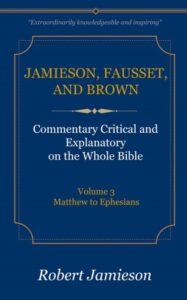
Commentary Critical, Practical and Explanatory on the Old and New Testaments, Robert Jamieson, A.R. Fausset and David Brown, 1871 (This cover is from Commentary Critical and Explanatory on the Whole Bible, Robert Jamieson, A.R. Fausset and David Brown, Volume 3 – Matthew to Ephesians, 2013 Edition, Delmarva Publications, Harrington, DE, USA.):
[Job 15]:22. “Flesh” and “soul” describe the whole man. Scripture rests the hope of a future life, not on the inherent immortality of the soul, but on the restoration of the body with the soul.
– Vol. I, p. 789 (Commentary on Job 15:22)
[Ezekiel 37:]1-28. THE VISION OF DRY BONES REVIVIFIED, SYMBOLIZING ISRAEL’S DEATH AND RESURRECTION … Though this chapter does not directly prove the resurrection of the dead, it does so indirectly; for it takes for granted the future fact as one recognized by believing Jews, and so made the image of their national restoration (so Isaiah, 25. 8 ; 26. 19 ; Daniel, 12. 2 ; Hosea, 6. 2 ; 13, 14; Cf. Note, v. 12).
– Vol. II, pp. 564, 565 (Commentary on Ezekiel 37:1-28).
[Mark 12:]27. He is not the God of the dead but [the God] of the living — not ‘ the God of dead but [the God] of living persons.’ The word in brackets is almost certainly an addition to the genuine text, and critical editors exclude it. ” For all live unto Him ” Luke, xx. 38—’ in His view,’ or ‘ in His estimation.’ This last statement — found only in Luke — though adding nothing to the argument, is an important additional illustration. It is true, indeed, that to God no human being is dead or ever will be, but all mankind sustain an abiding conscious relation to Him; but the “all” here mean “those who shall be accounted worthy to obtain that world.” These sustain a gracious covenant relation to God which cannot be dissolved. (Cf. Romans, vi. 10, 11.) In this sense our Lord affirms that for Moses to call the Lord the “God” of His patriarchal servants, if at that moment they had no existence, would be unworthy of Him. He “would be ashamed to be called their God, if He had not prepared for them a city” (Hebrews, xi. 16). It was concluded by some of the early fathers, from our Lord’s resting His proof of the Resurrection on such a passage as this, instead of quoting some much clearer testimonies of the Old Testament, that the Sadducees, to whom this was addressed, acknowledged the authority of no part of the Old Testament but the Pentateuch ; and this opinion has held its ground even till now. But as there is no ground for it in the New Testament, so Josephus is silente upon it, merely saying that they rejected the Pharisaic traditions. It was because the Pentateuch was regarded by all classes as the fundamental source of the Hebrew Religion, and all the succeeding books of the Old Testament but as developments of it, that our Lord would show that even there the doctrine of the Resurrection was taught. And all the rather does He select this passage, as being not a bare annunciation of the doctrine in question, but as expressive of that glorious truth out of which the Resurrection springs.
– Vol. III, pp. 212, 213 (Commentary on Mark 12:27).
[I Corinthians 15:]53. this — pointing to his own body and that of those whom he addresses, put on — as a garment (2 Corinthians, 5. 2, 3). Immortality — Here only, besides I Timothy, 6. 16, the word “immortality” is found. Nowhere [in Scripture] is the immortality of the soul, distinct from the body, taught: a notion which many erroneously have derived from heathen philosophers. Scripture does not contemplate the anomalous state brought about by death as the consummation to be earnestly looked for (2 Corinthians, 5. 4), but the resurrection.
– Vol. III, p. 784 (Commentary on 1 Corinthians 15:53).

Heinrich Hermann Schultz (1836-1903), German Protestant theologian, professor at Basel and Göttingen, chief university preacher, councillor to the State Consistory of the Church of Hanover and abbot of Bursfelde:
“If, therefore, any being who is not God has life, and especially if that life be indestructible, that can be so only by virtue of some relation with God. All beings in the universe, visible and invisible, are in relation with God as creatures with their Creator. Man is no exception; his life is not inherent: it is derived, and therefore may be destroyed. That which God has created cannot be a part of God, and consequently cannot have in itself the source of life. The creature must, therefore, be always dependent upon that divine source for the continuance of its life, and cannot be essentially immortal, even though its life should be prolonged to eternity by a power outside itself.”
(Petavel, The Problem of Immortality, p. 414.)
Repeating this view twenty years later, he wrote:
Gottingen, December 9th, 1881.
J. H. Pettingell.
My Dear Sir. — I am sorry to tell you that neither my leisure nor my knowledge of the English language will permit me to comply with your request. I can only tell you in a few words that my opinion as to “conditional immortality” is the same now as it was in 1861, when I published my book, “Die Voraussetzunger der Christlichen Lehre von der Unsterbtichkeit.”*
* The Principles of the Christian Doctrine of Immortality
I am quite sure that the common opinion about this doctrine is not derived from Christian origins, but from the dogmas of Greek philosophy which made God and the world equals, and naturally would find the source of divine and immortal life in nature, especially in the nature of man. The Gospel, teaching us that there is no life except from God’s will, compels us to think that there can be no everlasting life but only in God and in those natures which are got from Him.
When God made man His image and heir of immortality, He gave him a soul superior to the laws of destruction which reign in natural things, and capable of His own life. But he did not give him to have life in himself, separated from his Creator.
He made man heir of God’s own immortal life, but on condition of his remaining bound to his Lord in love and obedience (the tree of life in Eden). But man in his sinful separation from God has not this life. He is given to death, and only for his salvation or his judgment he was gifted with a transient life.
Only one of men has life in himself — God’s Son — in whom He pleased to reside with all His truth and love. Only from Him, and saved by Him, we may accept it and have it as our own. Whoever has God’s love has passed from death to life.
Whoever has not yet accepted God’s mercy has transient life, as long as he is capable of salvation or judgment. When he is saved he gains immortal life — in this life or hereafter.
Whoever is forever separated from God’s love in Christ is in the dominion of death. And if he remained in existence forever, it would not be from his own nature, but only from God’s terrible judgment. But the Gospel teaches us that there will be the Second Death, and that God will give the reprobate, with hell and death and the devil, to the eternal flames of His wrath — i. e., that He will destroy them as fire will destroy straw and wood thrown into it. That is what I think to be the doctrine of the Gospel, and I am glad to hear that this doctrine is now spreading fast in Christian countries.
Yours truly,
H. Schultz.
(“A Letter – By Professor HERMANN SCHULTZ, Gottingen, Germany”, in The Life Everlasting, John Hancock Pettingell, pp. 737, 738.)
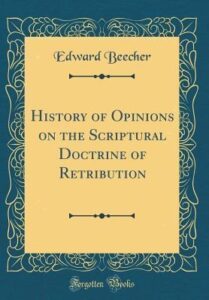
Edward Beecher (1803-1895), a Congregationalist theologian and president of Illinois College. He stated:
“If [the Bible] does not recognize, nay, it expressly denies the natural and inherent immortality of the soul. It assures us that God only hath immortality. (1.Timothy 6:16). By this we understand that He has immortality in the highest sense – that is, inherent immortality. All existence besides Himself He created, and He upholds. Men are not, as Plato taught, self-existent, eternal beings, immortal in their very nature. … There is no inherent immortality of the soul as such. What God created He sustains in being, and can annihilate at will.”
(Doctrine of Scriptural Retribution, p. 58.)
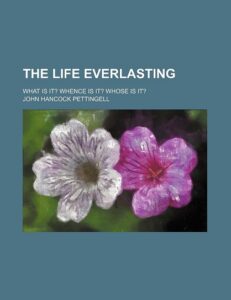
Amos A. Phelps, Is Man By Nature Immortal? in The Life Everlasting: What Is It? Whence Is It? Whose Is It? (1883):
“This doctrine (of natural immortality) can be traced through the muddy channels of a corrupted Christianity, a perverted Judaism, and pagan philosophy, and a superstitious idolatry, to the great instigator of mischief in the garden of Eden. The Protestants borrow it from the Catholics, the Catholics from the Pharisees, the Pharisees from the pagans, and the pagans from the old serpent who first preached the doctrine amid the lowly bowels of Paradise to an audience all too willing to hear and heed the new and fascinating theology: ‘Ye shall not surely die.’”
– p. 640.
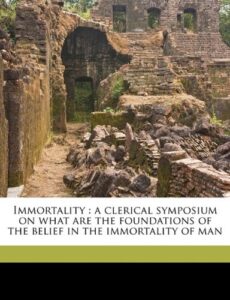
Immortality: A Clerical Symposium on What Are the Foundations of the Belief in the Immortality of Man, James Nisbet & Co., Londres, 1887 (this cover is from 2010 edition):
In the scriptural account of the creation and fall of man there is nothing to indicate that man was by creation an immortal being. On the contrary, his immortality is represented as depending, not on his condition by creation, but on something outside of him, his right to the use of which was contingent on his obedience, and from which he was cut off at his fall, “lest he should live for ever.” There is nothing to indicate that the “death” which his disobedience entailed affected one part only of his nature, or was anything short of utter abolition. In the declaration made to the woman there is indeed a dim indication of some victory over the serpent to be achieved in some way through the seed of the woman. But what should be the nature of this victory, or how it should be brought about, could not be gathered from so brief a hint; and if a fuller revelation were then made, at least we are not informed of it.
Accordingly it is not to be wondered at that in the records we possess of the Patriarchal and Jewish dispensations (at least till towards the close of the latter), so very little indication appears of any undoing of that special result of the Fall, that “death passed upon all men.” Prebendary Row has clearly pointed out how little, compara tively speaking, the thoughts of even good men in those ages were exercised by the contemplation of a future life, and how vague were their ideas respecting it. They died, we are told, in faith. But faith, we are at the same time told, may be of a very elementary character, consisting of a belief that God is, and that He is a rewarder of them that diligently seek Him. Some such kind of faith, more or less definite according to the extent of what was revealed to the individual or generally to the men of his time, constituting a view from afar of promises not received, may have led good men to a more or less confident anticipation that in some way God would not leave His servants to be triumphed over by death, but that there must be something in store for them beyond.
It is not proposed here to trace the origin of the far more definite views respecting a future life entertained by the Jews, or at least by a large party among them, before the Christian era. Let us pass on to consider the evidence of immortality which we find in the clearer light of the Christian dispensation.
Now, over and over again in the New Testament we find the offer of what is called eternal life to those who will accept it on the conditions on which it is offered. Those persons who bring to the in terpretation of such passages a preconceived notion of man s natural immortality are obliged to give to the expression “eternal life” a figurative meaning, and to eliminate from it the ordinary idea of life as living existence. For clearly that would not be offered as a gift which is already in possession, nor would that be spoken of as attained to by some which is the common lot of all. All, it is true we are told, are to be raised again, but not to all will it be a resurrection of eternal life. To the wicked it will only be a resurrection of judgment. Their fate is one over the details of which a veil is cast, but the language in which it is spoken of and the imagery by which it is illustrated seem to point to a miserable destruction, and in any case indicate something very terrible.
To the Christian, then, it is contended, the evidence of immortality rests upon its promise as a gift — a gift supernatural in its nature, and one the promise of which is attested by supernatural evidence. It involves resurrection, though resurrection alone does not guarantee it; and even the most strenuous advocates of a natural immortality, if they admit a resurrection at all, do not maintain that it is other than supernatural. Indeed, whatever may be thought of the condition of man between death and resurrection, in Scripture the question of a future life is bound up with that of the resurrection. Thus our Lord infers the resurrection, and implies that the Sadducees themselves might have inferred it from the words [to Moses] at the bush; and St. Paul, in contending that the doctrine of the resurrection belongs to the essentials of the faith, boldly uses the argument that its denial logically leads to the adoption of the manifestly unchristian maxim that we had best make the most of this life while we have it, for it is our all — “Let us eat and drink, for tomorrow we die.” The doctrine of a natural immortality irrespective of resurrection would have led to a very different conclusion.
Let it not be thought that to rest our hopes of immortality on the promise of the gift of eternal life lowers our idea of what this expression conveys; that those who attach a purely figurative interpretation to it understand by it something far higher. The notion that to base our hopes of immortality on the promise of eternal life involves any degradation of the meaning of the term merely arises from the previous divorce of the idea of immortality from that of obedience and concurrent happiness. Once accept the scriptural account of the Fall in what appears at least to be its straightforward interpretation — that man by disobedience forfeited immortality — and it stands to reason that immortality would only be restored in connection with a scheme where by the moral effects of the fall should be remedied, and man restored to a condition of complete righteousness. Thus the promise of eternal life as involving eternal living existence carries with it even in idea, as it does by the express declarations of Scripture, all that the advocates of a purely figurative interpretation put upon it ; but it carries something more, namely, living existence itself.
In this view, then, which, though evidently entertained in very early times, has only of late years been revived to any great extent, and which involves a more simple and straightforward interpretation of the declarations of Scripture on the subject than that which half a century ago was commonly received, the teaching of Scripture, the moral sense, the indications of science so far as they bear on the question, are all in harmony. The highest aspirations of those good men of old, who, though they “looked for a city which hath foundations,” yet “died in faith, not having received the promises,” are fulfilled, and more than fulfilled. The ominous forebodings of the wilful wrongdoer are met by the express proclamation of a very fearful and final doom, of “judgment and fiery indignation which shall devour the adversaries,” but we are not involved in the tremendous ethical difficulties which beset the supposed necessity of attaching an absolutely infinite, positive punishment to the sins of a finite life. Lastly, if a difficulty be felt in believing in a future life on the ground that the keenest scientific investigation fails to give the slightest indication of anything beyond the grave, which is contrary to what might be expected in the case of a naturally immortal being, the reply is — That is precisely what was to have been expected a priori on purely theological grounds. Man s whole being was forfeited by the Fall, and the future life is not his birthright, but depends on a supernatural dispensation of grace. To look to man s bodily frame for indications of immortality, to look even to his lofty mental powers — lofty indeed, but sadly misused — is to seek the living among the dead. Man must look not into himself but out of himself fur assurance of immortality. “Christ is risen from the dead, and become the first-fruits of them that slept. For since by man came death, by man came also the resurrection of the dead. For as in Adam all die, even so in Christ shall all be made alive.” [1 Cor. 15:20-22].
– pp. 118-124.

Cameron Mann, Five Discourses On Future Punishment, New York, USA, 1888.
So far as I can judge, the doctrine of the final destruction of impenitent sinners is suggested by the course of Nature, revealed in Holy Scripture, and conformed to our moral sense.
I do not, indeed, profess to hold this doctrine with the same confidence, nor to preach it with the same authority, that I feel regarding the divinity of our Lord, or the atonement, or the resurrection, or any other of those fundamental truths set forth in the Catholic Creeds. For in the case of the latter I have, besides my own conviction, based upon such study as I could make, the clear, positive witness of the Church, that they are essential portions of the gospel committed to her to teach to every creature throughout all time. These are the dogmas of the Church, which her clergy declare with all the warrant of her commission.
But the doctrine I shall explain and defend this evening I do not present as a dogma of the Church; I offer it simply as my own opinion concerning a subject on which she has not ruled; and I fully admit the right of those who have taken the same vows as myself to differ with me on this matter. But if they have rights, so have I. And on this subject I cannot be silent ; I must utter what after honest toil, I have concluded to be the most reasonable and best supported answer to a question which forces itself upon our attention. It is my constant office in this place to read the solemn warnings of the coming doom of sinners delivered by prophet and apostle, and by Jesus Christ Himself, and to lead you in your supplications that from His “wrath and everlasting damnation” God may ” deliver us.” It is my frequent duty to stand by an open grave, and to say, in behalf of myself, and those gathered around me, and of that one whose body lies so still before me, “In the midst of life we are in death; of whom may we seek for succour, but of Thee, O Lord, Who for our sins are justly displeased? Yet, O Lord God, most holy, O Lord most mighty, O holy and most merciful Saviour, deliver us not into the bitter pains of eternal death.” Am I never to offer any explanation of what damnation and eternal death probably are? Knowing, as I do, that explanations are current which on the one hand tend to make the doom of sinners so light that men cease to fear it, or on the other hand so repulsively unjust that they cease to believe in it, am I not simply in the line of my duty when I tell you what, so far as I can see, is the real, the awful, the equitable destiny of persistent sinners ? True, I have no formulated decree of a council, no binding article of a creed to set forth and explain. I can only give you my opinion, but that opinion is not the mere reflection of surrounding views, nor the obstinate preference of individualism, nor the careless offspring of chance. I am prepared not merely to say “I think so,” but to give good reasons for my thinking so.
The theory of the final destruction of the wicked, or, as it is more briefly and correctly named, the theory of “conditional immortality” is this: That men are not created with inherent immortality, with a soul, or body, or both, such as cannot be destroyed, but that immortality is a superadded gift which man’s nature is capable of receiving and which God bestows in such cases as He wills, and that He does not so will in the case of impenitent sinners; hence, it of course follows, that at some time all such offenders will cease to exist. Observe carefully the point of view taken by this doctrine. It does not regard the sinner as a naturally deathless being, whom because of his wickedness God violently annihilates. It regards the sinner as a mortal to whom God gave a certain term of life with the possibility that by loving God and receiving forever from him the vitalizing power of the Divine love he might become immortal, or, to speak more correctly, might alway be preserved alive; but failing of this, failing to become partaker of the Divine nature and to escape the corruption of the flesh, the sinful mortal endures only for the allotted term, and then passes back into the impersonal elements from which his nature was first shaped.
The doctrine involves no assertion of an absolute annihilation, which may or may not be philosophically conceivable. But man is a compound structure in body and soul. And what happens to the sinner in the eternal death is that his entire nature is broken up, dissolved, all individual characteristics vanishing, all personality lost. The component parts may still continue in the universe, but the man is no more. When a plant decays in the ground, although each atom of carbon and hydrogen and oxygen which made up its cellular tissue is still somewhere, that particular plant is gone: never again shall the dew lie soft on its leaves and the bee sip from its nectaries. And when a man perishes in Gehenna, when the bitter pains of eternal death have done their full work upon him, whatever particles of matter may mingle with the star dust, whatever scattered force may wander off through space, the man is gone; never again shall that particular personality feel or think, be conscious of the present or remember the past.
This is what conditional immortality teaches about damnation: it results in the utter destruction of the damned.
The theory is unmistakably not the popular one, for the prevailing notion is that men are naturally immortal, and it requires a vigorous mental wrench to get ourselves into position to even consider the possibility that they are not. Yet I think few people are aware upon how slight a basis the prevailing opinion rests; and as a preliminary step in considering the positive evidence for conditional immortality, it is needful to show that there is no substantial proof of unconditional.
Let it, however, be clearly understood at the outset, that conditional immortality does not deny that for all men there will be a future life, that there will be a resurrection of the unjust as well as of the just; on the contrary it asserts this, it views man’s alloted term as stretching into the next world, in many cases for education and discipline, in some at least for the vindication of justice. Nature dimly hints at this future life of all, Conscience demands it, and Scripture declares it.
… But some may say, at all events the Bible teaches that man is an immortal being. No, the Bible does not. Neither in the Old Testament nor in the New, is there a single statement that men are naturally and inherently immortal. Says Edward White — and all my study of Scripture confirms his statement — “Of the survival of souls in a Sheol or Hades, the Bible seems to speak often; of the actual eternal survival of the saved it also speaks; but it never once places the eternal hope of mankind on the abstract dogma of the immortality of the soul, or declares that man will live forever because he is naturally immortal.”
I cannot, of course, discuss all the texts bearing upon this matter. I can glance only at two or three. The Old Testament I must pass hastily by, though it most strongly supports my present position; for who can forget the point of view taken by those Psalms which express the highest devotional thought of the old Jewish Church? “Yet a little while and the wicked shall not be; yea, thou shalt diligently consider his place and it shall not be. The wicked shall perish, and the enemies of the Lord shall be as the fat of lambs; they shall consume; into smoke shall they consume away.” “The transgressors shall perish together; the end of the wicked shall be cut off.” “When the wicked spring as the grass and all the workers of iniquity do flourish, it is that they may be destroyed forever.” “He shall gnash with his teeth and melt away.” Are these expressions consistent with a belief in man’s natural immortality? Yet the Psalms are the part of the Old Testament where we find the strongest hopes of a future life for the righteous. But they rest solely on God’s grace. And so when the psalmist has exclaimed, “Thy kingdom is an everlasting kingdom and Thy dominion endureth throughout all generations,” he goes on and declares, “The Lord preserveth all that love Him, but all the wicked will he destroy.” It may perhaps be urged that the Jewish dispensation was one of temporal rewards and punishments, and that all these promises and threats are to be interpreted of this present life and world. Suppose it to be so, though I do not see how any one can fail to note the openings on eternity which are to be found all along in the writings of psalmist and prophet, yet the old dispensation was at least typical of the new, and in its language about things then we find the prophecy of things thereafter. And the whole burden of the prophecy is life for the righteous and death for the wicked.
Nor does the New Testament make any change in this teaching. It throws a stronger light on the future, but the same great facts stand out. Everywhere in the Gospel Jesus Christ is shown as the sole basis for human immortality. Never is there any intimation that men are naturally deathless. On the contrary, St. Paul distinctly declares that God only hath immortality; and in the two cases where he speaks of men as immortal he says that it is not something inherent, but conferred, this mortal is to “put on immortality,” and so death shall be swallowed up in victory. Nowhere does the New Testament say that Christ came to deliver man from an unending torment which would be the inevitable consequence of an unending existence in sin; but eighty times, in the writings of St. John alone, it is declared that the gift of life, or life everlasting, is the object of the Incarnation. Take one text as a sample. How clear the words ring out sounding the Gospel Message, “God so loved the world that He gave His only-begotten Son, that whosoever believeth in Him should not perish, but have everlasting life.”
What would any one naturally infer from such words, except that without Christ’s aid the doom of all men would be absolute destruction, and that such as rejected His aid must undergo that doom. I am aware that it has been attempted to set aside this tremendous and continuous and harmonious teaching of the New Testament by ascribing secondary meanings to the terms life and death, by dwelling upon their moral significance and their figurative uses. But all this kind of reasoning is attenuated and fallacious. Were there in Scripture any clear, positive affirmations that all men shall as a matter of course live for ever and ever, then its assertions that everlasting life comes only to those who believe in the Son of God, who are saved by Him, might perhaps be interpreted as signifying a glorious and blessed existence, and its assertions that the wicked shall perish might be construed as meaning that they shall exist in moral wreck and degradation.
But in the absence of any such affirmations — and they are totally absent — to put such secondary interpretation on words, and utterly deprive them of their primary and usual import, is most preposterous.
– pp. 113-118, 126-129.
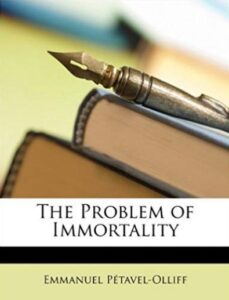
Emmanuel Pétavel-Olliff, The Problem of Immortality , 1892:
No doubt the spirit of God gives to man his vital force ; but that does not mean that the creature forms part of the Creator, and on that account possesses the immortality of God himself. The created soul has had a beginning ; it may, therefore, come to an end; it will come to an end unless an express purpose of the Creator perpetuates its existence.
– p. 53:
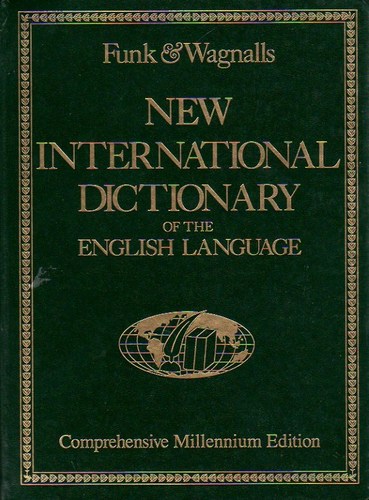
Funk & Wagnalls Standard Dictionary of the English Language, Funk & Wagnalls Company, New York, USA, 1893 (This cover is from 2001 edition).
Soul. The principle or vehicle of the life of the individual, animal or human, conceived of as a substance, quality, or efficient cause of the phenomena of sentience and consciousness in general. While some form of conception corresponding to this word has been found in all ages and among all peoples, it has assumed several more or less distinct varieties in the attempts of human thought and imagination to define it clearly. Among the ancient Egyptians and Greeks, as well as among the more primitive peoples, soul has been conceived of after the analogy of some especially refined or ethereal substance such as the breath, or a species of fire, or ether, etc. The development of religious conceptions, very early and almost universally, caused the soul to be regarded as partaking of a divine nature and to be ascribe to the gods or to God as a divine gift. This view, combine with the phenomena of dreams and other experience of a suggestive sort together with the difficulty of consciously thinking oneself out of conscious existence, led inevitably to the belief in the separability of the soul from the bodily organism and in its continuance after the dissolution of the organism. Among the ancient Hebrews soul was the equivalent of the principle of life as embodied in living creatures, and this meaning is continued throughout the Bible, altho in the later Biblical writings the allied conception of spirit, as being more or less distinct from soul, is made the principle and vehicle of the higher and more obviously divine activities and capacities of human nature. It was Augustine especially who, in part on religious grounds and in part as the disciple of the later Greek Philosophy, taught the simple, immaterial and spiritual nature of the human soul – a view which has remained that of the scholastic philosophy and of Christian theologians down to the present time. Descartes, by his theory of automatism as applied to the bodily organism and his doctrine that the essence of soul is rational thinking, gave the modern turn to the present diverse views of the true conception. Of these views, monistic idealism, materialism, parallelism, and functional interactionism are among the more prominent. The older forms of substantialism, or the entity theory, are now quite generally abandoned.
– 1913 Edtion, Vol. IV, p. 2322.
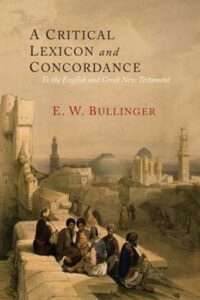
Ethelbert William Bullinger, A Critical Lexicon and Concordance to the English and Greek New Testament, Longmans, Green & Co., London, England, 1895 (This cover is from 2014 reprint):
2 – άδης, HADES. This is a heathen word and comes down to us surrounded with heathen traditions, which had their origin in Babel, and not in the Bible, and have reached us through Judaism and Romanism.
As Hades (a word of human origin) is used in the New Testament, is the equivalent for the Hebrew sheol (a word of divine origin), its meaning can be gathered not from human imagination, but from its Divine usage in the Old Testament. If we know this, we know all that can be known. We therefore give a complete list of all its sixty-five occurrences in the Old Testament. We give the list, complete, from the A.V., with the R.V. variations; calling attention to the fact that the American R.V. does not translate the word at all, but simply transliterates it thus: “Sheol.”
Then, after listing all those 65 uses of Sheol in the Old Testament, he continues:
On a careful examination of the above list, a few facts stand out very clearly.
(i.) It will be observed that in a majority of cases Sheol is rendered “the grave.” To be exact, 54 per cent.: while “hell” is 41 ½ per cent.; and “pit” only 4 ½ per cent. The grave, therefore, stands out on the face of the above list as the best and commonest rendering.
(ii.) With regard to the word “pit,” it will be observed that in each of the three cases where it occurs (Num. 16:30, 33; and Job 17:16), the grave is so evidently meant, that we may at once substitute that word, and banish “pit” from our consideration as a rendering of Sheol.
(iii.) As to the rendering “hell,” it does not represent Sheol, because both by Dictionary definition and by colloquial usage “hell” means the place of future punishment. Sheol has no such meaning, but denotes the present state of death. “The grave” is, therefore, a far more suitable translation, because it visibly suggests to us what is invisible to the mind, viz., the state of death. It must, necessarily, be misleading to the English reader to see the former put to represent the latter.
(iv.) The student will find that “the grave,” taken literally as well as figuratively, will meet all the requirements of the Hebrew Sheol: not that Sheol means so much specifically A grave, as generically the grave.
Holy Scripture is all-sufficient to explain the word Sheol to us.
(v.) If we enquire of it in the above list of the occurrences of the word Sheol, it will teach
(a) That as to direction it is down.
(b) That as to place it is in the earth.
(c) That as to nature it is put for the state of death. Not the act of dying, for which we have no English word, but the state or duration of death. The Germans are more fortunate, having the word sterbend for the act of dying.
Sheol therefore means the state of death; or the state of the dead, of which the grave is a tangible evidence. It has to do only with the dead. It may sometimes be personified and represented as speaking, as other inanimate things are. It may be represented by a coined word, Gravedom, as meaning the dominion or power of the grave.
(d) As to relation it stands in contrast with the state of the living, see Deut. 30:15, 19, and 1 Sam. 2:6-8. It is never once connected with the living, except by contrast.
(e) As to association, it is used in connection with
mourning (Gen. 37:34-35),
sorrow (Gen. 42:38; 2 Sam. 22:6; Ps. 18:5; 116:3),
fright and terror (Num. 16:27, 34),
weeping (Isa. 38:3, 10, 15, 20),
silence (Ps. 31:17; 6:5; Eccles. 9:10),
no knowledge (Eccles. 9:5-6, 10),
punishment (Num. 16:27, 34; 1 Kings 2:6, 9; Job 24:19; Ps. 9:17, R.V., RE-turned, as before their resurrection).
(f) And, finally, as to duration, the dominion of Sheol or the grave will continue until, and end only with, resurrection, which is the only exit from it (see Hos. 13:14, etc.; and compare Ps. 16:10 with Acts 2:27, 31; 13:35).
If now the eleven occurrences of Hades in the New Testament be carefully examined, the following conclusions will be reached:
(a) Hades is invariably connected with death; but never with life: always with dead people; but never with the living. All in Hades will “NOT LIVE AGAIN,” until they are raised from the dead (Rev. 20:5). If they do not “live again” until after they are raised, it is perfectly clear that they cannot be alive now. Otherwise we do away with the doctrine of resurrection altogether.
(b) That the English word “hell” by no means represents the Greek Hades; as we have seen that it does not give a correct idea of its Hebrew equivalent Sheol.
(g) That Hades can mean only and exactly what Sheol means, viz., the place where “corruption” is seen (Acts 2:31; compare 13: 34-37); and from which, resurrection is the only exit.
– pp. 367-369 (from 1999 edition).
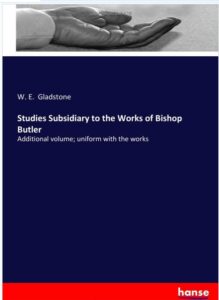
William E. Gladstone Studies Subsidiary to the Works of Bishop Butler, Oxford, Clarendon Press, 1896:
[It is only] from the time of Origen that we are to regard the idea of natural, as opposed to that of Christian, immortality as beginning to gain a firm foothold in the Christian Church.”
“The doctrine of natural, as distinguished from Christian, immortality had not been subjected to the severer tests of wide publicity and resolute controversy, but had crept into the Church, by a back door as it were; by a silent though effective process; and was in course of obtaining a title by tacit prescription.”
“Another consideration of the highest importance is that the natural immortality of the soul is a doctrine wholly unknown to the Holy Scriptures, and standing on no higher plane than that of an inegeniously sustained, but gravely and formidably contested, philosophical opinion.”
“The character of the Almighty is rendered liable to charges which cannot be repelled so long as the idea remains that there may by His ordinance be such a thing as never-ending punishment, but that it will have been sufficiently vindicated at the bar of human judgment, so soon as it has been established and allowed that punishment, whatever else it may be, cannot be never-ending.”
SUMMARY OF THESES ON A FUTURE LIFE (only the first six points):
1. THAT the natural immortality of the soul is not taught in Holy Scripture.
2. Neither is it commended by the moral authority of the quod semper, quod ubique, quod ab omnibus, even after placing that comprehensive dictum under such limitations as it reasonably admits.
3. Neither is it affirmed or enjoined by any of the great assemblies of the undivided Church, or by any unanimity, actual or moral, of Decrees and Confessions posterior to the division of the Church into East and West.
4. The immortality of the soul is properly to be regarded as holding its place in religion from its being a gift or endowment due to the Incarnation of our Lord.
5. The survival of the soul after death is in itself distinct from the immortality of the soul, and is included in the doctrine of the Resurrection; and was so treated by the earlier Fathers of the Church.
6. Also, the existence of the soul after death, which was so largely believed in old religions outside the Hebrew revelation, was a belief in survival, and was not associated with any formal examination and adoption of an absolutely endless life.
– pp. 184, 195, 197, 241 and 260.
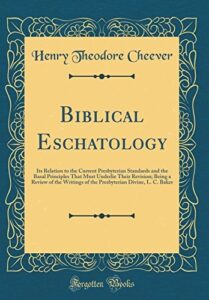
Henry Theodore Cheever (1814–1897), American divine, Presbyterian-Congregationalist minister of Worcester, Massachusetts, USA:
“Christianity needs to base its hope of immortality for man more distinctly upon the fact that Christ is risen, and that perishable man is to live again, not because of his inherent immortality*, but because God has provided that in Him, the Christ, all shall be made alive. And this new resurrection-life for the race of man through its second Adam, the ideal perfect man, must be viewed as but the consummation of a creative process and promise begun from the foundation of the world (Titus 1:2) and necessary to complete the design of the Author, which is to bring forth out of the matrix of this system an anointed race worthy to wear its crown, and to be, under Christ, the administrators of His authority and bounty to endless ages.”
* The weight of Scripture testimony is that man, as to both body and soul, is perishable. We freely admit that an immortal spirit of life from God lives in him. But the very question at stake in his moral training is whether this life of God shall build for itself an eternal habitation in him. He may become so degraded in character, he may so judge himself unworthy of eternal life, that this immortal spirit may not only cease to strive with him, but to live in him. In that case his personality and individual being must vanish away. He fails of eternal life.
Our Saviour teaches that men may so harden themselves against the grace of God as “to have no forgiveness, neither in this world nor in the world to come.” But the doctrine of “a resurrection of judgment ” gives hope for the dead, that their failure here is not necessarily final and remediless. That all will be saved, that there will be no refuse of human souls in this great work-shop of God, is too much to affirm. But that He is bound by His own character, or by His Word, to endow every creature of the human race with personal immortality, we are not required to believe, either by the analogies of nature or by the statements of His Word, although we may be sure that those who are unworthy of this dignity of immortality, and who must therefore be cast away, are not doomed to an endless existence in hopeless torture. They may go down in the scale of creation until they become “like brute beasts made to be taken and destroyed.” But if so, they must like them “utterly perish in their own corruption” (II. Peter 2:12). — Words of Reconciliation, Volume IV., page 232.
– pp. 53, 54.
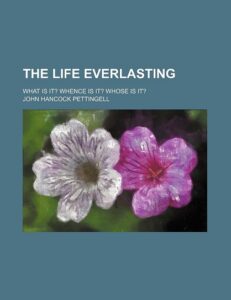
John Hancock Pettingell, The Life Everlasting: What Is It? Whence Is It? Whose Is It?, 2nd edition, J.D. Brown, Philadelphia, USA, 1883:
Life and Death as phenomenal words need no definition or explanation, for they designate phenomena with which we are all familiar. Scientists and metaphysicians may inquire into their interior signification; and dispute about the real source and essence and meaning of these phenomena; but for all practical purposes these terms need no definition. The same is true of all the ultimate and antithetical terms that are in common use in our language, or in any language. Their meaning is so obvious that any attempt to define them, like the attempt to demonstrate an axiom, tends only to obscure the subject and confuse the mind.
Life as a phenomenon of Nature is everywhere visible. So is death. The one is set over against the other. Hence they are called antithetical terms. They explain each other. If the one be known, the other must also be known. But death is not simply the antithesis of life, as darkness is of light, and cold is of heat. It is more. It implies a previous life. It denotes the loss of what was once possessed. We do not predicate death of a stone or a lump of clay. We say they are lifeless. They are not dead, because they have never had life and have never died. “Lifeless” is the proper negation of “life.”
Neither can we predicate degrees of death as we can of many other terms. It is an absolute and ultimate term. Nothing can be said to be dead so long as there is any life in it. It may be almost dead, or about to die, but it is not dead till all life is utterly extinguished.
We sometimes, however, use the term death proleptically, or by anticipation of what is sure to follow; as when we say of one who is attacked by a fatal disease, or has received a fatal wound, “He is a dead man.” But we can use this figure only with reference to the actual death in view.
It is true of all words that have their application to material and physical things, that they are susceptible of secondary and tropical uses; for we have no other way of speaking of things that are beyond the reach of our senses than by the use of such terms.
All spiritual truths are represented by terms that have a physical or material base. It is by means of the resemblance which they are supposed to have to sensible things that we can at all apprehend them. Hence the necessity in treating of these higher truths, not only of using these physical terms, but of adhering strictly to the idea expressed by them, if we would understand ourselves or be understood by others. For, unless the strictest analogy be preserved, we might as well use one term as another or no terms at all, for no definite idea would be expressed by them.
A man’s life may be said to be in the hands of another, who has the power to take it from him. Or a child may be said to be dead to his parents when his life is entirely lost to them. We readily understand such figures of speech. But if the analogy be far-fetched or obscure, our meaning will be obscure in the same degree. This is the reason why some metaphysical speculations are so hard to be understood. The terms that are used suggest no analogy to our minds. This is why some sorts of poetry convey to us no meaning, or are susceptible of almost any interpretation our fancy may dictate. This was just the secret of the Delphic oracles. They were intentionally couched in tropical terms of ambiguous application. This is just the use to which theological speculators would put the Oracles of God — the Sacred Scriptures. By interpreting the language of Holy Writ in a tropical sense, they may put into it any meaning their fancy or philosophy may require.
There are no words in the Bible that have suffered more from this kind of treatment than these two words, Life and Death; for they are two of the most important words in the whole Bible. The whole controversy between ourselves and those who hold to the deathless nature of man centers in these two words. They are the two hinges on which the whole question turns. If they are to be taken literally when referring to the destiny of man, as we maintain, then our opponents have no ground to stand on for one moment. They must give up the case at once. It is absolutely necessary to the maintainance of their position, that the literal and ordinary meaning of these two words should be taken out of them, when the destiny of man is spoken of; and, as they must have some meaning, another must be found and put into them, that will harmonize with their doctrine concerning the immortality of all men.
We hold that the Scriptures mean just what they say, when they set forth death as the sure result of sin, and endless perpetuity of life as the portion of the righteous only. We believe that Jehovah meant just what He said, just what Adam must have understood Him to mean, when He promised him perpetuity of life only on condition of obedience, and threatened him with death in case of disobedience. He could not have understood these words in any other sense, nor did he, till the Tempter suggested another meaning — a, figurative meaning — as he still continues to do to all who will listen to his interpretation.
We hold that when men now die in consequence of sin, they actually die; and that they live again, not because they are immortal and must naturally live on, and live for ever, but only by the gracious purpose of God as made known in the Gospel of Christ, who is the Resurrection and the Life; and that through Him, and Him only, another life, a higher and better, an Eternal life, is given to His redeemed people; and that the second death of the unsaved is also an actual death, from which there is no resurrection.
They hold, on the other hand, that to the active, conscious, sensitive life of man there is no end, no literal death, as in the case of every other living creature upon the earth; that both the first death and the second death, spoken of in the Scriptures as the consequence of sin, denote a state of sin and misery which, if the sinner is not recovered from it, will be endlessly perpetuated in hell; and that the life, the everlasting life which Christ gives to His redeemed people, is a state of purity and blessedness endlessly perpetuated in heaven. Now we believe that such trifling with the plain declarations of God’s Word Is utterly unwarranted, sacrilegious, and subversive of the truth. In the name of the Master, whose word is the supreme rule of our faith, we protest against it, and insist on accepting and understanding these words — Life and Death — as meaning just what they seem to mean. We do this for the following reasons:
1. There is no good reason why they should not be so accepted and understood.
…
2. It is contrary to all the well established and universally accepted rules of interpretation, to put an uncommon meaning into the words of any writer, unless we are especially authorized by him to do so, or unless the character of the document itself shall warrant it.
…
3. These two words — Life and Death — are not merely the crucial words in this controversy, but they are the principal words by which the sanctions of the Divine Law are made known to us.
…
4. No other reasonable or satisfactory definition can be given, to these words.
…
5. It is only by accepting these words, Life and Death, according to their plain, literal sense, that the Scriptures — especially the historical, doctrinal, didactic and hortatory portions — can be made intelligible and self-consistent.
…
– pp. 175-207 (See also pp. 537-600).
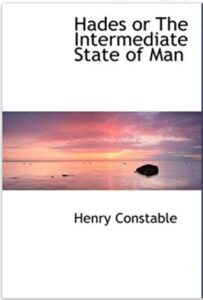
Henry Constable, Hades; or, the Intermediate State of Man, London: Elliot Stock, 62, Paternoster Row, E.C., 1873.
VI. We will next draw our readers’ attention to the fact that Hades is always spoken of in the Old Testament as a place of death. The ordinary Platonic theology tells us that the grave, the receptacle of the body, is a place of death, but that Hades, the receptacle of disembodied souls, is a place of life. Denying that the soul in death dies or perishes: holding that it retains a perfect life, susceptible of every thought that we now have, even beyond its power here susceptible of joyous or painful emotions, and in the case of the redeemed enjoying a happiness greater by far than it had ever experienced in this age or world, they hold, and must needs hold. Hades to be a land of life. For all, good and bad, they must hold it to be a land of the living; while, with their ideas of what life in its most true and proper sense means, viz., well being and happiness and holiness, they must in the case of redeemed souls hold Hades to be pre-eminently a land of life. Where there is no sin — where there is no sorrow — where peace and happiness are enjoyed, and even a brighter existence is looked forward to with hope and assurance, is most assuredly and unquestionably a land of life. Compared with it this present earth, even in its happiest aspect, is a vale of tears. Accordingly the very names which common theology attach to that part of Hades where the righteous souls are supposed to dwell apart from the wicked fully carries out their idea of it. Two of those names are “Paradise”, and “Abraham’s Bosom”. Paradise is a land of life: Abraham’s Bosom is a land of life. And thus it is clearly seen that whatever ideas they may attach to the supposed division of Hades, where they locate wicked souls, that part of Hades where they locate righteous souls must be truly and preeminently a land of life.
VII. But is it ever thus spoken of in the Old Testament? We leave out of view here the case of wicked souls. It might well be that it would be only in gloomy terms that Scripture would speak of their locality. So we will leave them out altogether. But righteous souls, and righteous men, are in Hades as well as they. Now does Scripture ever once speak of Hades in connection with them as a land of life? Never. Not so much as once. We call upon our Platonic divines to produce a single passage of the Old Testament which does. We know of course that there is here and there a poetical image, as Isaiah xiv., where those in Hades are said to perform the acts of living men. To all such we will apply ourselves by and by. If we do not mistake, every such passage speaks of the wicked and not of the righteous. But what we do say is this, that every passage of the Old Testament that speaks without poetical figure of Hades in relation to believers, or describes the feelings of believers at their prospect of entering upon the Hades state, speaks of that state and place as one of death and not of life.
– pp. 53, 54.
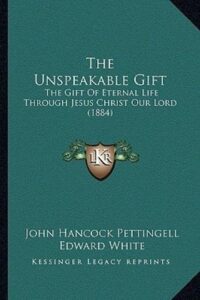
Edward White, The Unspeakable Gift, 1884:
“I steadfastly maintain, after 40 years of study of the matter, that it is the notion of the infliction of a torment in body and soul that shall be absolutely endless, which alone gives a foot of standing ground to Ingersol in America, or Bradlaugh in England. I believe more firmly than ever that it is a doctrine as contrary to every line of the Bible as it is contrary to every moral instinct of humanity.”.
– Introduction, p. 22.
In the following year he added:
“The Old Testament is consistent throughout with the belief of eternal life of the servants of God, and of the eternal destruction of the wicked. And it is consistent, when taken in its simple sense with no other belief …”
“The Gospels and Epistles with equal pertinacity adhere almost uniformly to language respecting the doom of the unsaved which taken in its simple sense, teaches, as does the Old Testament, that they shall die, perish, be destroyed, not see life, but suffer destruction, everlasting destruction, `destruction,’ says Christ, `of body and soul in Gehenna.’
– Homiletic Monthly (England), March, 1885.
“The Bible nowhere teaches an inherent immortality; but teaches that it is the object of redemption to impart it. … The communication of it requires a regeneration of man, by the Holy Spirit, and a resurrection of the dead.”
– Report, London Conference on Conditional Immortality, May 15, 1876, pp. 28, 29. About this conference, Edward White stated:
“These are the ideas which have brought us together this morning. They are now firmly held by an immense multitude of thoughtful people of all lands, for although we are but a little company here assembled, we represent an immense army in Europe and America. These views are spreading every day amongst the churches; and number among their adherents some of the foremost men of science, theologians, missionaries, philologers, philosophers, preachers, and statesmen.”
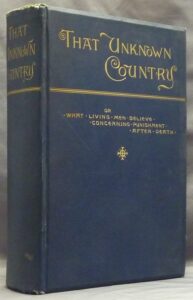
George G. Stokes, That Unknown Country: or Future Retribution According to the Teachings of Scripture and the Opinions of Sages, Scholars and Divines, C. A. Nichols & Co., Publishers, Massachussets, USA, 1888.
The advocates of the theory of the natural immortality of the soul seem to be nearly unanimous in the belief that, at death, man passes into some different state of conscious existence, which undergoes a further change at the resurrection. And many who do not hold the theory just mentioned agree, in this respect, with those who do. Moreover, it seems to be towards some such condition that the thoughts of uninstructed nations turn, when they think of a future state at all.
No argument for the natural immortality of the soul, that the writer has seen, appeal’s to him to be of any value; and, as to a prevalent belief among uninstructed nations, if it be true that man was created in a condition in which, if he had continued, he would have been lit for immortality, and was endowed with aspirations after immortality, it was natural that, after the forfeiture of immobility through transgression, man should seek to satisfy his craving for immortality by imagining that he had something immortal in his nature. It is, then, to revelation that we must look, if we are to find out something about man’s condition in the intermediate state.
Now, as it was through the gospel that life and immortality were brought to light, it is chiefly to the New Testament’ that we should look for information on the subject now before us. We find, how- ever, that it is to the state after resurrection that our thoughts are there, mainly, at least, directed, when a future life is dwelt on. It has been well said that Scripture bases our hopes of a future life, not upon the immortality of the soul, but upon the resurrection of the body. There are comparatively few passages in which the intermediate state even appears to be referred to at all. Of these, two or three are so dark that their real interpretation is quite uncertain. There are two or three in which, at first sight, the intermediate state seems to be referred to as one of consciousness, but which, on further examination, are seen to be, as the writer thinks, perfectly and naturally explicable on the opposite supposition. It is not in accordance with the plan of this collection that the writers should enter into argument, but it is wished that they should state their own opinions; and, in accordance with this desire, the writer of the present article ventures to say that his own mind leans strongly to the view that the intermediate state is one in which, as in a faint, thought is in abeyance; one which, accordingly, involves a virtual annihilation of intervening time for each individual in particular.
But be that as it may, this much appears to be certain: that in the popular theology and popular hymns the intermediate state receives an expansion utterly unlike what we find in Scripture; an expansion which goes far towards banishing from view the resurrection state and the day of judgment, though, as to the latter, so prominent a place did it occupy in the minds of apostles and those to whom they wrote, that they frequently speak of it simply as “the day,” or “that day.”
– pp. 828-830.

John J. S. Perowne, Hulsean Lectures on Immortality, 1868:
… The immortality of the soul is a phantom which eludes your eager grasp.
The immortality of the soul is neither argued nor affirmed in the Old Testament.
– p. 31.
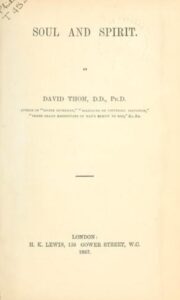
David Thom, Soul and Spirit, London, 1867:
“The life of soul, or human mind, was, as we perceive from Genesis ii. 17, to have been conditionally protracted for ever ; or, if the phrase be better liked, had a conditional immortality conferred upon it. But the condition was violated. Gen. iii. 1—6. Of this violation, the death of soul was the immediate and necessary result: 7th and following verses. Leaving out of view, therefore, for the present, the question as to whether soul was in its original state really immortal or not, it is, if the declarations of the word of God are to be rested in, a fact, that now at least it is mortal, or, more correctly speaking, dead.
… Soul, according to scripture, did not become mortal merely, but actually died, the moment that Adam transgressed; transgression, or, if you will, the necessary effect of transgression, having been its death: and dead, it has ever since continued, and as soul ever will continue.
… The soul as we have seen, is not an immaterial, meaning thereby, a substantial principle; but is merely the type, figure or shadow of such a substantial principle. Every conclusion, therefore, drawn from this its assumed substantiality, and, among the rest, the supposed inference that it is naturally and essentially immortal, falls to the ground with the premises upon which it is erected. A shadowy mind, so far from necessarily existing for ever, may, nay must, like a shadowy body, pass away or die.”
– pp. 33, 34.
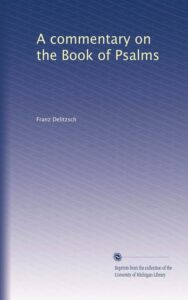
Franz Julius Delitzsch, A Commentary on the Book of Psalms, New York, USA, 1883 (Translated from third edition in German, 1873).
Man’s soul is his doxa; it is so, inasmuch as it is the image of the divine doxa (Psychol., p. 98 and freq.).The expression “let him lay… in the dust” is also at least as favourable to this sense of נְבֵלָתִ֖י [together], as to the sense of personal and official dignity (iii. 4, iv. 3). To lay in the dust is equivalent to, to lay in the dust of death (xxii. 16). שֹׁכְנֵ֣י עָפָ֗ר [you who dwell in the dust] (Isa. xxvi. 19) are the dead. According to the biblical view, the soul may be killed (Num. xxxv. 11) and is mortal (Num. xxiii. 10). It binds spirit and body together, and this bond is severed by death.
– Vol. 1, p. 180. (Cf. Neuer Commentar über die Genesis, 3rd edition, 1860, p. 190.).

Robert W. Dale (1829-1895), a Congregationalist pastor of Carr’s Lane Church in Birmingham. He was editor of The Congregationalist magazine; chairman of the `Congregational Union of England and Wales’; and president of the `First International Council of Congregational Churches in 1891′. He announced his acceptance of conditionalism in a paper before the Congregational Union of 1874.
“Eternal life, as I believe, is the inheritance of those who are in Christ. Those who are not in Him will die the Second Death from which there will be no resurrection … I am not conscious that they (the positions of Conditionalism) have at all impaired the authority in my teaching of any of the great central doctrines of the Christian faith. The doctrine of the Trinity remains untouched; and the doctrine of the incarnation, and the doctrine of the atonement in its evangelical sense, and the doctrine of justification by faith, and the doctrine of judgment by works, and the doctrine of regeneration have received, I believe, from these conclusions a new and intenser illustration.”
(Recorded in Freer’s ‘Edward White’, His Life and Work, 1902, pp. 354-355.)
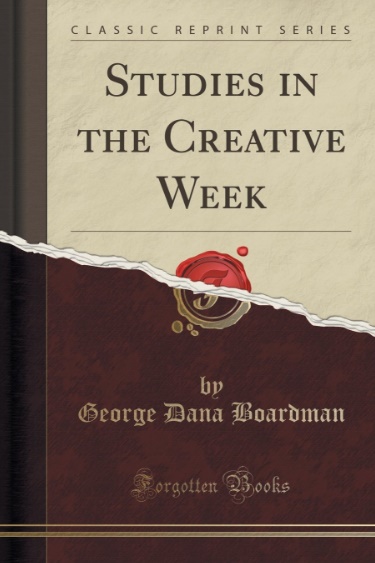
George Dana Boardman, Studies in the Creative Week, 1878:
“Not a single passage of Holy Writ, from Genesis to Revelation, teaches, so far as I am aware, the doctrine of Man’s natural immortality. On the other hand, Holy Writ emphatically declares that God only hath immortality (1.Tim. 6:16): that is to say: God alone is naturally, inherently, in His own essence and nature, immortal.”
“If, then, Man is immortal, it is because immortality has been bestowed on him. He is immortal, not because he was created so, but because he has become so, deriving his deathlessness from Him Who alone has immortality. And of this fact the `Tree of Life’ in the midst of the Garden seems to have been the appointed symbol and pledge. That this is the meaning of the `Tree of Life’ is evident from the closing words of the Archive of the Fall:
“Jehovah God said: `Behold, the Man hath become as one of Us, to know good and evil: and now, lest he stretch forth his hand, and take also of the `Tree of Life’, and eat, and live forever:’ therefore Jehovah God drove the Man forth from Eden, and stationed on the East of the Garden the Cherubim, and the Flaming Sword which turned away every way, to guard the way to the `Tree of Life’.” Genesis 3:22-24
If Man is inherently immortal, what need was there of any `Tree of Life’ at all? This much, then, seems to be clear: Immortality was somehow parabolically conditioned on the eating of this mysterious Tree, and the Immortality was for the entire Man – spirit and soul and body.”
– pp. 215, 216.
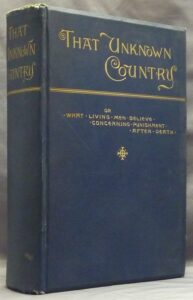
Lyman Abbott, a Congregationlist pastor and editor of Christian Union and The Outlook. He wrote:
Outside of the walls of Jerusalem, in the valley of Gehenna, was kept perpetually burning a fire, on which the offal of the city was thrown to be destroyed. This is the hell fire of the New Testament. Christ warns his auditors that persistence in sin will make them offal to be cast out from the holy city, to be destroyed. The worm that dieth not was the worm devouring the carcasses, and is equally clearly a symbol not of torture but of destruction.”
“The notion that the final punishment of sin is continuance in sin and suffering is also based in part on, what seems to me, a false philosophy of man. This philosophy is that man is by nature immortal. The conviction has grown on me, that according to the teaching of both of science and Scripture, man is by nature an animal, and like all other animals mortal; that immortality belongs only to the spiritual life; and that spiritual life is possible only in communion and contact with God; that, in short, immortality was not conferred upon the race in creation whether it would or not, but is conferred in redemption, upon all those of the race who choose life and immortality through Jesus Christ our Lord.
That Unknown Country, Or, What Living Men Believe Concerning Punishment After Death [Future Retribution According to the Teachings and Scripture and the Opinions of Sages, Scholars & Divines especially at the present time], C. A. Nichols & Co., Publishers, Massachussets, USA, 1888; “There Is Very Little in the New Testament to Warrant Belief in Endless Conscious Sin and Suffering,” pp. 65-74.
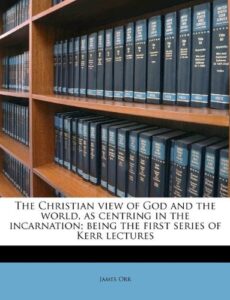
James Orr,The Christian View of the God and the World, as Centring in the Incarnation , New York, USA: Anson D. F. Randolph and Co., 1893:
The Bible, as we shall immediately see, knows nothing of an abstract immortality of the soul, as the schools speak of it; nor is its Redemption a Redemption of the soul only, but of the body as well. It is a Redemption of man in his whole complex personality — body and soul together. It was in the body that Christ rose from the dead; in the body that He has ascended to heaven; in the body that He lives and reigns there for evermore. It is His promise that, if He lives, we shall live also; and this promise includes a pledge of the resurrection of the body. The truth which underlies this is, that death for man is an effect of sin. It did not lie in the Creator’s original design for man that he should die, — that these two component parts of his nature, body and soul, should ever be violently disrupted and severed, as death now severs them. Death is an abnormal fact in the history of the race; and Redemption is, among other things, the undoing of this evil, and the restoration of man to his normal completeness as a personal being.
… The true Biblical doctrine of immortality, then, I think, includes the following points:—
1. It rests on the Biblical doctrine of human nature. According to the Bible, and according to fact, man is a compound being — not, like God and the angels, a pure spirit, but an embodied spirit, a being made up of body and of soul. The soul, it is true, is the higher part of human nature, the seat of personality, and of mental, moral, and spiritual life. Yet it is intended and adapted for life in the body, and body and soul together make the man—the complete human being.
2. It was no part of the Creator’s design for man in his ideal constitution that body and soul should ever be separated. The immortality man was to enjoy was an immortality in which the body was to have its share. This is the profound truth in the teaching of the Bible when it says that, as respects man, death is the result of sin. Had sin not entered we must suppose that man — the complete man — would have enjoyed immortality; even his body, its energies replenished from vital forces from within, being exempt from decay, or at least not decaying till a new and more spiritual tenement for the soul had been prepared. With the entrance of sin, and departure of holiness from the soul, this condition ceased, and the body sank, as part of general nature, under the law of death.
3. The soul in separation from the body is in a state of imperfection and mutilation. When a human being loses one of his limbs, we regard him as a mutilated being. Were he to lose all his limbs, we would regard him as worse mutilated still. So, when the soul is entirely denuded of its body, though consciousness and memory yet remain, it must still be regarded — and in the Bible is regarded—as subsisting in an imperfect condition, a condition of enfeebled life, diminished powers, restricted capacities of action — a state, in short, of deprivation. The man whose life is hid with Christ in God will no doubt with that life retain the blessedness that belongs to it even in the state of separation from the body — he will “be with Christ, which is far better”; but it is still true that so long as he remains in that disembodied state, he wants part of himself, and cannot be perfectly blessed, as he will be after his body, in renewed and glorified form, is restored to him.
4. The last point, therefore, in the Biblical doctrine is, that true immortality is through Redemption, and that this Redemption embraces the Resurrection of the body. It is a complete Redemption, a Redemption of man in his whole personality, and not simply of a part of man. This is a subject which will be considered afterwards. It is enough for the present to have shown that the Biblical doctrines of man’s nature, of the connection of sin and death, of Redemption, and of the true immortality, cohere together and form a unity — are of a piece.
– pp. 229-233.
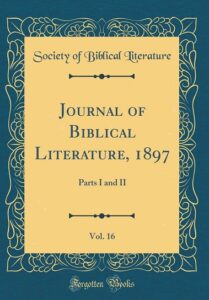
Charles Augustus Briggs, “The Use of נֶפֶש in the Old Testament”, Journal of Biblical Literature, Vol. 16 (1897. This cover is from 2018 Edition):
If this inductive study is correct in its results, it is evident that some of the current statements as to Biblical psychology are wrong. Readers of the Bible will have to be exceedingly careful lest they go astray from the Biblical usage when they follow the ordinary renderings of נפש [nephesh] in our English Bibles. Soul in English usage at the present time conveys usually a very different meaning from נפש [nephesh] in Hebrew, and it is easy for the incautious reader to misinterpret.
– p. 30.
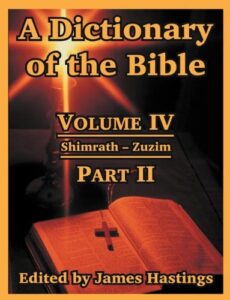
James Hastings (Ed.), Dictionary Of The Bible, four volumes, T. & T. Clark (Edinburgh, Scotland) and Charles Scribner’s Sons (New York, USA), 1898-1902 (this cover is from 2004 edition):
SOUL. — The use of the term in the OT (Heb. nephesh) for any animated being, whether human or animal (Gn 1:20 ‘life,’ 2:7), must be distinguished from the Greek philosophical use for the immaterial substance which gives life to the body, and from the use in the NT (Gr. psyche) where more stress is laid on individuality (Mt 16:25 RVm). As the Bible does not contain a scientific psychology, it is vain to dispute whether It teaches that man’s nature is bipartite (body and soul or spirit) or tripartite (body and soul and spirit): yet a contrast between soul and spirit (Heb. ruach, Gr. pneuma) may be recognized; while the latter is the universal principle imparting life from the Creator, the former is the individual organism possessed of life in the creature (Gn 2:7 — ‘breath of life’ and ‘living soul’). — In some passages the terms are used as equivalent (Is 26:9, Lk 1:46, 47, Ph 1:27 RV), in others a distinction is made (He 4:12, 1 Th 5:23). The distinction is this: ‘soul’ expresses man as apart from God, a separate individual; ‘spirit’ expresses man as drawing his life from God (cf. Jn 10:11, ‘life’ = ‘soul,’ and 19:30). This separate individuality may renounce its dependence and refuse its submission to God. Hence the adjective ‘psychical’ may be rendered sensual (Ja 3:15, Jude 19 [RVm ‘Or, natural. Or, animal’]), or natural (1 Co 2:14, 15:44-46). Probably sensual in the two passages conveys more moral meaning than the term ‘psychical’ justifies, and natural is the better rendering, as expressing what belongs to the old unregenerate life in contrast with the characteristic of the new life in Christ, the spiritual (pneumatic). A parallel change in the use of the term ‘flesh’ and its corresponding adjective may be noted.
– 1909 edition (one-volume), p. 872.
Soul is throughout a great part of the Bible simply the equivalent of ‘life’ embodied in living creatures. In the earlier usage of the Old Testament it has no reference to the later philosophical meaning – the animating principle – still less to the idea of an ‘immaterial nature’ which will survive the body. ‘A living soul’ in Genesis and other records is simply an ‘animated being,’ and the word is applied equally to the lower animals and to man. When the life is emphasized as human, it signifies life in the individual. This meaning it takes especially when נֶ֫פֶשׁ, ψυχή is put in contrast with רוּחַ, πνεῦμα ‘spirit,’ which then comes to signify the principle of life. In this way ‘soul’ acquires more precisely the idea of the individual life in man, the Self, the Ego, although it may denote other aspects of man than the intellectual, and, in fact, is sometimes equivalent to ‘heart’ as well as to ‘mind’ … In the NT the emphasis on the personality becomes most marked in such sayings of our Lord as Mt 16:25, 26, Mk 8:35.
The development of a double expression for man’s inner life (ψυχή, πνεῦμα) gives throughout the whole Bible a usage which is often not much more than a vague parallelism, as, e.g., in Is 26:9, Lk 1:46, 47, Ph 1:27 (RV). It undoubtedly, however contains a hint everywhere of the antithesis between the life-principle and the individual life. Where the two are set side by side, as in He 4:12, the actual relation subsisting between the ‘soul’ and its life-principle (‘spirit’) is brought into view. While in the older language of the Gospels σῶμα and ψυχή appear as the two constituent parts of human nature (Mt 10.28), there is in the Pauline usage a threefoldness: τὸ πνεῦμα the Divine life-principle, ή ψυχή the individual life in which the πνεῦμα is manifested, τὸ σῶμα the material organism vivified by the ψυχή (1 Th 5:23).
Where the most distinct antithesis occurs is in the use of the adjective psychic or soulish (ψυχικός). In the only places in which ψυχικός occurs in OT Greek (2 Mac 4:37, 14:24) it means ‘hearty.’ [In 4 Mac 1:32 something more purely psychological is meant, but this is hardly biblical Greek]. In the NT another interest comes in. In the six instances where ψυχικός occurs (not wholly Pauline), an altogether new antithesis is introduced. What is natural or human in the ψυχή is contrasted with what is Divine and divinely given in the πνεῦμα Θεού. So that ψυχικός has acquired a meaning almost equivalent to ‘carnal’ or ‘sensual,’ by which latter word it is twice rendered in AV. But since the πνεῦμα and πνευματικός, with which it is contrasted, is the Divine spirit in regeneration, it seems fair to render ψυχικός ‘natural’ as AV does in four of these places, and RVm in the other two (see 1 Co 2:14 15:44 bis 46, Ja 3:15, Jude 19). Thus Christianity has enriched this word ψυχικός, adding to its psychological sense an ethical or even a theological significance.
Additional NT instances of the use of ψυχή in composition are ἄψυχα ‘soulless,’ or ‘lifeless,’ 1 Co 14:7; σύμψυχοι ‘of one accord,’ Ph 2:2; ἰσόψυχον ‘like minded,’ Ph 2:20; δίψυχος ‘double-minded,’ Ja 1:8, 4:8.
– 2004 edition, Vol. IV, p. 608.
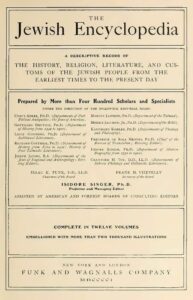
The Jewish Encyclopedia, New York and London, Funk & Wagnalls Co., 1901-1906:
IMMORTALITY OF THE SOUL (late Hebrew, “hasharat ha-nefesh”; “haj’ye ‘olam”): The belief that the soul continues its existence after the dissolution of the body is a matter of philosophical or theological speculation rather than of simple faith, and is accordingly nowhere expressly taught in Holy Scripture. As long as the soul was conceived to be merely a breath (“nefesh”; “neshamah”; comp. “anima”), and inseparably connected, if not identified, with the life-blood (Gen. ix. 4, comp. iv. 11; Lev. xvii. 11; see SOUL), no real substance could be ascribed to it. As soon as the spirit or breath of God (“nishmat” or “ruaḥ ḥayyim”), which was believed to keep body and soul together, both in man and in beast (Gen. ii. 7, vi. 17, vii. 22; Job xxvii. 3), is taken away (Ps. cxlvi. 4) or returns to God (Eccl. xii. 7; Job xxxiv. 14), the soul goes down to SHEOL or Hades, there to lead a shadowy existence without life and consciousness (Job xiv. 21; Ps. vi. 6 [A. V. 5], cxv. 17; Isa. xxxviii. 18; Eccl. ix. 5, 10). The belief in a continuous life of the soul, which underlies primitive ANCESTOR WORSHIP and the rites of necromancy, practised also in ancient Israel (I Sam. xxviii. 13 et seq.; Isa. viii. 19; see NECROMANCY), was discouraged and suppressed by prophet and lawgiver as antagonistic to the belief in Yhwh, the God of life, the Ruler of heaven and earth, whose reign was not extended over Sheol until post-exilic times (Ps. xvi. 10, xlix. 16, cxxxix. 8).
As a matter of fact, eternal life was ascribed exclusively to God and to celestial beings who “eat of the tree of life and live forever” (Gen. iii. 22, Hebr.), whereas man by being driven out of the Garden of Eden was deprived of the opportunity of eating the food of immortality (see Roscher, “Lexikon der Griechischen und Römischen Mythologie,” s.v. “Ambrosia”). It is the Psalmist’s implicit faith in God’s omnipotence and omnipresence that leads him to the hope of immortality (Ps. xvi. 11, xvii. 15, xlix. 16, lxxiii. 24 et seq., cxvi. 6-9); whereas Job (xiv. 13 et seq., xix. 26) betrays only a desire for, not a real faith in, a life after death. Ben Sira (xiv. 12, xvii. 27 et seq., xxi. 10, xxviii. 21) still clings to the belief in Sheol as the destination of man. It was only in connection with the Messianic hope that, under the influence of Persian ideas, the belief in resurrection lent to the disembodied soul a continuous existence (Isa. xxv. 6-8; Dan. xii. 3; see ESCHATOLOGY; RESURRECTION).
The belief in the immortality of the soul came to the Jews from contact with Greek thought and chiefly through the philosophy of Plato, its principal exponent, who was led to it through Orphic and Eleusinian mysteries in which Babylonian and Egyptian views were strangely blended, as the Semitic name “Minos” (comp. “Minotaurus”), and the Egyptian “Rhadamanthys” (“Ra of Ament,” “Ruler of Hades”; Naville, “La Litanie du Soleil,” 1875, p. 13) with others, sufficiently prove. Consult especially E. Rhode, “Psyche: Seelencult und Unsterblichkeitsglaube der Griechen,” 1894, pp. 555 et seq. A blessed immortality awaiting the spirit while the bones rest in the earth is mentioned in Jubilees xxiii. 31 and Enoch iii. 4. Immortality, the “dwelling near God’s throne” “free from the load of the body,” is “the fruit of righteousness,” says the Book of Wisdom (i. 15; iii. 4; iv. 1; viii. 13, 17; xv. 3). In IV Maccabees, also (ix. 8, 22; x. 15; xiv. 5; xv. 2; xvi. 13; xvii. 5, 18), immortality of the soul is represented as life with God in heaven, and declared to be the reward for righteousness and martyrdom. The souls of the righteous are transplanted into heaven and transformed into holy souls (ib. xiii. 17, xviii. 23). According to Philo, the soul exists before it enters the body, a prison-house from which death liberates it; to return to God and live in constant contemplation of Him is man’s highest destiny (Philo, “De Opificio Mundi,” §§ 46, 47; idem, “De Allegoriis Legum,” i., §§ 33, 65; iii., §§ 14, 37; idem, “Quis Rerum Divinarum Hæres Sit,” §§ 38, 57).
It is not quite clear whether the Sadducees, in denying resurrection (Josephus, “Ant.” xviii. 1, § 4; idem, “B. J.” ii. 12; Mark xii. 18; Acts xxiii. 8; comp. Sanh. 90b), denied also the immortality of the soul (see Ab. R. N., recension B. x. [ed. Schechter, 26]). Certain it is that the Pharisaic belief in resurrection had not even a name for the immortality of the soul. For them, man was made for two worlds, the world that now is, and the world to come, where life does not end in death (Gen. R. viii.; Yer. Meg. ii. 73b; M. Ḳ. iii. 83b, where the words , Ps. xlviii. 15, are translated by Aquilas as if they read: , “no death,” ἀθανασία).
– Vol. VI, 1903, pp. 564-566.
RESSURRECTION – Biblical Data: Like all ancient peoples, the early Hebrews believed that the dead go down into the underworld and live there a colorless existence (comp. Isa. xiv. 15-19; Ezek. xxxii. 21-30). Only an occasional person, and he an especially fortunate one, like Enoch or Elijah, could escape from Sheol, and these were taken to heaven to the abode of YHWH, where they became angels (comp. Slavonic Enoch [a pseudephigraphic written late in 1st century CE], xxii.). In the Book of Job first the longing for a resurrection is expressed (xiv. 13-15), and then, if the Masoretic text may be trusted, a passing conviction that such a resurrection will occur (xix. 25, 26). The older Hebrew conception of life regarded the nation so entirely as a unit that no individual mortality or immortality was considered. Jeremiah (xxxi. 29) and Ezekiel (xviii.) had contended that the individual was the moral unit, and Job’s hopes are based on this idea.
A different view, which made a resurrection unnecessary, was held by the authors of Ps. xlix. and lxxiii., who believed that at death only the wicked went to Sheol and that the souls of the righteous went directly to God. This, too, seem based on views analogous to those of Jeremiah and Ezekiel, and probably was not widely held. In the long run the old national point of view asserted itself in the form of Messianic hopes. These gave rise to a belief in a resurrection in order that more might share in the glory of the Messianic kingdom. This hope first finds expression in Isa. xxvi. 19, a passage which Cheyne dates about 334 B.C. The hope was cherished for faithful Israelites. In Dan. xii. 1-4 (about 165 B.C.) a resurrection of “many . . . that sleep in the dust” is looked forward to. This resurrection included both righteous and wicked, for some will awake to everlasting life, others to “shame and everlasting contempt.”
– Vol. X, 1905, p. 382.
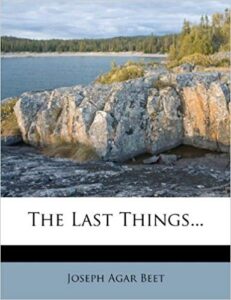
Joseph Agar Beet,The Last Things – Preface to The Immortality of the Soul: A Protest, 5th Ed., 1902
“The following pages are … a protest against a doctrine which, during long centuries, has been almost universally accepted as divine truth taught in the Bible, but which seems to me altogether alien to it in both phrase and thought, and derived only from Greek Philosophy. Until recent times, this alien doctrine has been comparatively harmless. But, as I have here shown, it is now producing more serious results …”
“It will of course be said, of this as of some other doctrines, that, if not explicitly taught in the Bible, it is implied and assumed there … They who claim for their teaching the authority of God must prove that it comes from Him. Such proof in this case, I have never seen.“
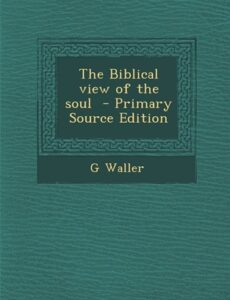
George Waller, The Biblical View of the Soul, Longmans, Green and Co., London, New York and Bombaim, 1904 (this cover is from 2013 edition):
‘THE Immortality of the Soul’ is a doctrine of Heathen Origin. It was held by the Pagan Priests of Chaldea, Babylonia, and Egypt, centuries before the Christian Era; and by Pythagoras the Philosopher, who taught the pre-existence and transmigration of souls. After him it was taught by Socrates, a most celebrated heathen philosopher, and after him by Plato and the Platonists, from which sect sprang some of the earliest heresies of the Christian Church of the first four centuries. The doctrine of the existence of the soul or spirit of man in happiness or misery after death, independent of the body, is nowhere to be found in the Old or New Testament Scriptures; whilst in the New Testament the Resurrection of the body is everywhere held up as the great central hope of the Christian Church…
From the above quotation [Gen. 3:19-24], we learn that man was created from dust, a material Organism or body, perfect in every part, fitted for the exercise of all the powers and faculties of mind and body for which he was created, through the means of the senses, of seeing, hearing, &c., with which he was endowed, and which were in the body; but, different from all the lower animals, he was gifted with the power of Reason, by which he would be able to know and understand, and follow the will of his Creator, when revealed. But this Organism or body was lifeless, until God breathed into man’s nostrils the breath of life; then, and not till then, life and motion be came apparent in every part, and man became a ‘living soul’, or person; capable of exercising all those powers of mind and body with which God had endowed his Organism, and would have continued to use them, and forever, but for the sin of disobed ience, by reason Of which he was to be deprived of the perpe tual use and exe rcise of them , and was to realise the dreadful sentence of the curse, in being driven out of the Paradise of Eden, with death and mortality begun…
The Biblical view of death, therefore, is a perfect cessation of all the powers and faculties of mind and body, as they have been exercised in a living material organism or body, when ‘the dust shall return to the earth as i t was; and the spirit’, that is the breath or life of all men (good or bad), shall return unto God who gave it’, Eccl. xii. 7.
– pp. 65, 67, 68.
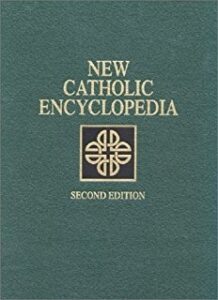
The Catholic Encyclopedia: An International Work of Reference on the Constitution, Doctrine, Discipline, and History of the Catholic Church, 1907 (this cover is from New Catholic Encyclopedia, Catholic University of America e McGraw-Hill Book Company, 1967):
IV. The Platonic School. — Plato’s School, like Aristotle’s, was organized by Plato himself and handed over at the time of his death to his nephew Speusippus, the first scholarch, or ruler of the school. It was then known as the Academy, because it met in the groves of Academus. The Academy continued, with varying fortunes, to maintain its identity as a Platonic school, first at Athens, and later at Alexandria until the first century of the Christian era. It modified the Platonic system in the direction of mysticism and demonology, and underwent at least one period of scepticism. It ended in a loosely constructed eclecticism. With the advent of neo-Platonism (q. v.), founded by Ammonius and developed by Plotinus, Platonism definitively entered the cause of Paganism against Christianity. Nevertheless, the great majority of the Christian philosophers down to St. Augustine were Platonists. They appreciated the uplifting influence of Plato’s psychology and metaphysics, and recognized in that influence a powerful ally of Christianity in the warfare against materialism and naturalism. These Christian Platonists underestimated Aristotle, whom they generally referred to as an “acute” logician whose philosophy favoured the heretical opponents of orthodox Christianity. The Middle Ages completely reversed this verdict. The first scholastics knew only the logical treatises of Aristotle, and, so far as they were psychologists or metaphysicians at all, they drew on the Platonism of St. Augustine. Their successors, however, in the twelfth century came to a knowledge of the psychology, metaphysics, and ethics of Aristotle, and adopted the Aristotelean view so completely that before the end of the thirteenth century the Stagyrite occupied in the Christian schools the- position occupiedin the fifth century by the founder of the Academy. There were, however, episodes, so to speak, of Platonism in the history of Scholasticism — e. g., the School of Chartres in the twelfth century — and throughout the whole scholastic period some principles of Platonism, and especially of neo-Platonism, were incorporated in the Aristotelean system adopted by the schoolmen. The Renaissance brought a revival of Platonism, due to the influence of men like Bessarion, Plethon, Ficino, and the two Mirandolas. The Cambridge Platonists of the seventeenth century, such as Cudworth, Henry More, Cumberland, and Glanville, reacting against humanistic natural naturalism, “spiritualized Puritanism” by restoring the foundations of conduct to principles intuitionally known and independent of self-interest. Outside the schools of philosophy which are described as Platonic there are many philosophers and groups of philosophers in modern times who owe much to the inspiration of Plato, and to the enthusiasm for the higher pursuits of the mind which they derived from the study of his works.
– 1911 Edition, Vol. XII, pp. 161, 162.
SOUL (IN THE BIBLE)
Soul in the OT is nepeš, in the NT, ψυχή. The definitions and the use of these terms will be treated in this article.
In the Old Testament. Nepeš comes from an original root probably meaning to breathe. Thus the noun form means neck or throat opened for breathing, thence, breath of life. Since breath distinguishes the living from the dead, nepeš came to mean life or self or simply individual life. Nepeš is used in regard to both animals and humans. If life is human, nepeš is equivalent to the person, the “I.” After death, the nepeš goes to Sheol.
The above summary indicates that there is no dichotomy of body and soul in the OT. The Israelite saw things concretely, in their totality, and thus he considered men as persons and not as composites. The term nepeš, though translated by our word “soul,” never means soul as distinct from the body or the individual person. Other words in the OT such as spirit, flesh, and heart also signify the human person and differ only as various aspects of the same being.
In Ps 68 (69).2, the phrase, “the waters threaten my life,” is literally “waters come up to nepeš” (cf. Jn 2.6; Is 5.14; Prv 23.2). The sense of throat for nepeš is apparent in these places. The word nepeš means breath in Jb 41.21: “His breath [nepeš] sets coals afire; a flame pours from his mouth.” In 1 Kgs 17.22, it means breath of life, “And the soul [nepeš] of the child returned into him and he revived” (cf. 2 Kgs 17.21; 2 Sm 1.9; Jer 38.16).
In Gn 9.4, “But flesh with its life [nepeš ]—that is, its blood—you shall not eat,” the comparison shows more of an abstract meaning for nepeš as life in general without signifying breath or breathing (cf. Lv 17.11; Dt 12.23). Finally, nepeš means the individual being itself whether of animals or men. In Gn 2.7, “Then the Lord God… breathed into his nostrils the breath of life, and man became a living being,” the Hebrew word for being is nepeš. Of animals, Prv 12.10 says, “The just man takes care of his beast,” literally, “the nepeš in his beast.”
As a human life, nepeš can be identical with the personal pronoun or the reflexive pronoun (Gn 27.4, 25; Lam 3.24, where “says my soul” could be just as correctly translated “say I,” etc.). As the “I,” the nepeš performs all the sensations of an individual. The nepeš hungers, thirsts, hopes, longs, loves, and hates.
At death, the nepeš goes to Sheol, a place of an insensitive, shadowy existence. Many psalms pray for the rescue of one’s nepeš from death, where the rescue means to be saved from dying, not to be raised from the dead. Happiness after death is known only in late OT revelation.
In the New Testament. The term ψυχή is the NT word corresponding with nepeš. It can mean the principle of life, life itself, or the living being. Through Hellenistic influence, unlike nepeš, it was opposed to body and considered immortal.
The psyche in Mt 10.28, “And do not be afraid of those who kill the body but cannot kill the soul [psyche]; but rather be afraid of him who is able to destroy both soul and body in hell,” means a life that exists separately from the body. The meaning of psyche in our Lord’s statement, “[T]he Son of Man has not come to be served but to serve, and to give his life [psyche] as a ransom for many,” is obviously His mortal existence (Mt 20.28; Jn 10.11). As a living being, subject to various experiences, it can refer to animals, “And every live thing [psyche] in the sea died” (Rv 16.3), or to humans, “Fear came upon every soul [psyche]” (Acts 2.43; Rom 2.9; 13.1). Thus the psyche feels, loves, and desires. In this connection it can be used to mean the personal or reflexive pronoun, as in Jn 10.24, “How long dost thou keep us [our psyches] in suspense?”
Thus far, ψυχή is quite similar to the Hebrew nepeš, except for Mt 10.28. Under the Greek influence, however, it was gradually opposed to body and was used for the immortal principle in man (Rv 6.9; 20.4).
In summary, the Hebrew nepeš generally is connected with the concrete sign of life in the individual, the “I” that feels, wills, pants for, etc. Its end is Sheol. The Greek counterpart, ψυχή, includes many of the meanings of nepeš; but it has added to the concept “I,” the immortality of later philosophy and revelation…
Nepes is a term of far greater extension than our ‘soul,’ signifying life (Ex 21.23; Dt 19.21) and its various vital manifestations: breathing (Gn 35.18; Jb 41.13, blood, desire (2 Sm 3.21; Prv 23.2). The soul in the OT means not a part of man, but the whole man—man as a living being. Similarly, in the NT it signifies human life: the life of an individual, conscious subject (Mt 2.20; 6.25; Lk 12.22-23; 14.26; Jn 10.11, 15, 17; 13.37).
– 1967 Edition, Vol. XIII, pp. 449, 450, 467.

Johan Wilhelm Personne, Til Prästerskapet i Linköpings stift:
As pertains to these our confessional writings, there is a very important doctrine, which is treated very briefly, vaguely and unsatisfactorily. I mean the doctrine concerning the state of the dead, and in general the doctrine of the last things. This was, and still is, the weakest point of the Lutheran confessional writings. This is due to the Reformers’ fear of the Roman doctrine of purgatory and indulgence. In view of this, the “orthodox” presentations relative to the state of the dead and the final things are very ambiguous. I understand that it is still “orthodox” to teach that the destiny of man is decided when he dies, so that he then goes [immediately] to heaven or hell. The doctrine of an intermediate state between death and the final judgment is really yet considered heretical. But how shall we “orthodoxly” consider the final judgment? Shall the spirits of the dead be summoned together from heaven and hell to be clothed with their bodies and again be judged? Why they have already at death received their final judgment according to the old “orthodox” doctrine.”
… It is evident that we must think of an intermediate state between death and the judgment, which the Bible quite clearly teaches, namely “Hades” or “Kingdom of death”…. If in this doctrine there shall be order or reason-and that we Lutherans, both clergy and laity, have a right to demand-then our confessional writings on this point must be considered changed in accordance with the teachings of the old ancient church. Indirectly this began twenty-eight years ago [1883] when in the New Testament and the apostolic confession of faith, the old incorrect Lutheran translation of “Hades” by “hell” was changed to the correct translation, “kingdom of death.”
…For me it is inexplainable how a person, who holds that orthodox view, can at any time have a glad moment in this life. He is constantly mingling with people whose final destiny will be to be “tormented eternally without end“: and if he lives in a large community, he hears almost daily the church bells announce-according to his “orthodox” view that a human soul has been cast into the eternal torment, without end. To me it is even more inexplainable, that such an “orthodox” person can expect even a happy moment in eternity, when he knows that contemporaneously with his blessed estate, continue the endless torment and agony of innumerable millions of the accursed. Can he, if he loves his neighbors as himself, yes, even if he has just a little bit of human love and is not solely a selfish wretch, have even a single happy moment? For, according to such an orthodox person’s doctrine, death would often be the door to eternal damnation and to endless agony for his nearest of kin, for his parents, his brothers and sisters, for his companion, and his children. How can such a person, unless he is extremely wanton, have a single happy moment?
– pp. 20, 21, 24, 25. Above: Map of Sweden, with that diocese in highlight).
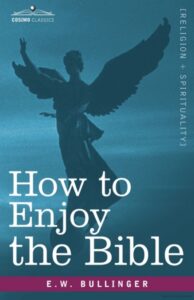
Ethelbert William Bullinger, How To Enjoy The Bible: or, The “Word,” and “The Words,” How To Study Them, London: Eyre & Spottiswoode (Bible Warehouse), Ltd. 33, Paternoster Row, E.G., 1910 (This cover is from a 2007 edition):
“Absent from the Body.” — 2 Cor. v. will furnish us with another illustration of the importance of the Structure in determining the Scope. And we have seen, under Canon I., the necessity of the Scope to give us the meaning of the word, and to show us how indispensable it is for a right understanding of the whole.
The Structure will show us how much we lose by the break between the fourth and fifth chapters of the second Epistle to the Corinthians. Chapter v. commences as though it began an entirely fresh subject, whereas it begins with the word “FOR,” which shows that it is the conclusion of what had been begun towards the end of ch. iv. That subject is Resurrection as our blessed hope in view of the perishing of our outward man day by day. As a comforting conclusion it is added, “FOR we know that if our earthly house of this tabernacle were dissolved, we have a building of God, an house not made with hands, eternal, in the heavens.” This is one of the “things unseen,” and which are “eternal”; at which, and for which, we are to “look.”
Where the real literary and logical breaks occur can be discovered only from the Structure.
As a matter of fact, 2 Cor. v. forms part of a member which runs from 2 Cor. iii. 1—vi. 10; but we must not make such an arbitrary statement without producing the evidence, so that others may judge for themselves as to its accuracy.
To prove this we must first give the Structure of 2 Cor. as a whole.
… We can see very clearly now, that the wonderful ground of support of Paul and Timothy in their afflictions was the consideration of the “unseen” things, as outweighing the “things seen”; so that though the “earthen vessels” of their bodies were dissolved there was the “excellency of the power” of God which would be put forth in Resurrection.
It is thus seen how the break between chapters iv. and V. destroys the connection; in fact, breaks in two the one member, “h2” (ch. iv. -16—v. 5), which has only one subject, viz., Resurrection, as the ground of the confidence, and the reason for not fainting in their labours of ministry.
We might have included this under the head of rightly dividing the Word of truth as to its literary form, as shown by the division into chapters (pages 34, 35). We might also have included it under the heading of the importance of the Scope of a passage (Canon I.). We might have included it under the heading of the importance of the Context (see below, Canon III.). It belongs to all three; but considering that the Structure is necessary to the crowning proof, we have given this illustration here.
It is little less than a crime for anyone to pick out certain words and frame them into a sentence, not only disregarding the scope and the context, but ignoring the other words in the verse, and quote the words ‘absent from the body present with the Lord’ with the view of dispensing with the hope of Resurrection (which is the subject of the whole passage), as though it were unnecessary; and as though ‘presence with the Lord’ is obtainable without it!
Apart from the doctrine involved, and apart from the teaching of Tradition (true or false), it is a literary fraud thus to treat the words which the Holy Ghost teacheth.
We see therefore, for it must be clear to us, that the Scope of a passage is the key to its words; and that the Structure of a passage is the key to its Scope.
This will show us the importance of our second Canon.
How great must be our loss if we fail to use this key to the wonderful words of God.
Like all His works they bear the minutest searching out.
All the works of God are perfect. And the microscope and telescope can both be used to examine them; though neither of them can ever exhaust the wonders of God’s works. In both directions an increase of the power of the lens will reveal new beauties and fresh marvels.
The Word of God, being one of His works, must have the same phenomena: and nothing exhibits these phenomena like the Study of its Literary Structure.
To us, God’s Word is the greatest and most important of all His works. If we understand all His other works (which no one does or can) and yet know not His Word, our knowledge will not carry us beyond the grave.
But we must not lose sight of the great underlying lesson, and the great outcome of the whole of this subject, which is this : If the external form be so perfect, what must the inward truth be: if the setting be so valuable, how valuable must be the jewel: if the literary order be Divine, how solemn must be the warnings, how important the truth, how faithful the promises, how sure the words of which the Word is made up.
– pp. 223-226.
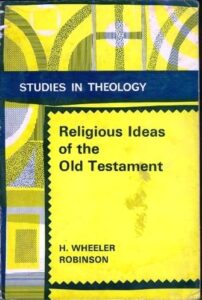
Henry Wheeler Robinson, The Religious Ideas of the Old Testament, T. and A. Constable, Ltd., UK, 1913. (This cover is from a reprint of Second Edition, 1968):
The Psychology of the Hebrews
There is a logic in primitive thought which is often obscured to modern eyes because it works from premises so different from our own. We are apt do dismiss as fanciful metaphor much that was simple realism; in fact, the science of the ancient world has often become the poetry of the modern. This is evident in regard to those speculations about human nature which the Hebrews, or their ancestors, shared with primitive peoples in general. The obvious explanation of the difference between a dead and a living man was the respective absence or presence of breath, and in consequence there is no more common theory of the soul than that which identifies it with the breath. To the Hebrew, the soul is not an esoteric and mystical abstraction; it is the breath, and the breath which is the principle of life naturally comes to be regarded as the centre of the consciousness of life, and of all its physical or psychical phenomena. The Hebrew word for this breath-soul is nephesh, and the best translation of it is often simply ‘life’. When the prophet Elijah has prayed for the restoration to life of the child of the widow of Zarephath, ‘the child’s nephesh returned upon his inward parts, and he lived’. The idea is clearly that of the breath as animating the physical organs of the body, almost as materialistically conceived as when we think of steam setting an engine in motion. Equally obvious as natural is the extension of the term nephesh to cover the inner consciousness of life. The early ‘Book of the Covenant’ says ‘a sojourner thou shalt not oppress, for ye know the nephesh of the sojourner, since ye were sojourners in the land of Egypt’. The usage of nephesh could extend to
‘All thoughts, all passions, all delights,
Whatever stirs this mortal frame’,but, in practice, for reasons to be given, it was chiefly used of the emotional life, and, in particular, of physical appetite, or psychical desire. All this is perfectly straightforward, and raises no problems. The complications that have arisen for the study of Hebrew psychology are due to a feature common to much primitive thought. That thought does not start from one centre only in its explanation of phenomena, but from several independent ideas. Thes distinct explanations eventually converge on the fact to be explained, and are reconciled by some form of syncretism, which continues to puzzle the modern investigator until he ceases to expect a systematic arrangement, an looks simply for the different lines to approach. The second line of approach to the problem of life adopted by Hebrew thought is also shared with primitive peoples in general. It sets out from the different organs of the body, both central and peripheral. These are credited with different contributions to the conscious life, because ancient and primitive thought has not learnt to distinguish between the physical and the psychical. Thus the Hebrews spoke of the (physical) heart as the actual centre of the conscious life in general, and of both its emotional and intellectual aspects. The term is as general in its original scope as was nephesh. But, as a result of the syncretism of these two parallel ideias, ‘heart’ and nephesh come to denote predominantly the intellectual and the emotional aspects of consciousness respectively, without complete surrender of their more comprehensive usage. This is the explanation of such words as those of the Deuteronomic appeal: ‘Thou shalt love Yahweh thy God with all thy heart and with all thy nephesh, and with all thy might’ (vi. 5). This sentence covers the conscious life of the whole personality, in both its thought and its feeling.
There is also, however, in the Old Testament, a third line of approach to the mystery of human personality – viz. that afforded by the term ruach, or ‘spirit’. This forms one of the most fascinating and important subjects of Biblical theology, and the ideas which cluster around it are the most characteristic of Old Testament ideas in regard to human nature. It is often said, by those who have not studied the history of the usage in its chronological development, that ruach is simply another term for the breath-soul, a synonym of nephesh, though with a higher range of meaning. To say this is to neglect the important fact that ruach is not used of the breath-soul in man, or with psychical predicates, in any pre-exilic passage. The original meaning of the term, a meaning it retains throughout all periods of Hebrew literature, is ‘wind’. From that usage it passed over to denote the mysterious wind-like influences, the demonic forces, which were supposed to account for what is abnormal and strange in human conduct. We have to remember that primitive thought, to a degree we find it hard to imagine, supposes man to be constantly accessible to such influences. The quarrel that arose between Abimelech and the men of Shechem is ascribed to an evil ruach sent by God; the madness of Saul and the remarkable strenght of Samson are similarly explained. But that which was more or less abnormal before the Exile comes to be more or less normal after it; by the time of Ezekiel, ruach is used of the breath-soul in man, as was nephesh. Yet it always retains – and this is a most important point to notice – the ‘higher’ associations of its origin. It stands for those more exceptional and unusual endowments of human nature which suggest God as their immediate source, the more normal nephesh being taken for granted. It links man to God, as though it were a door continually open to His approach. The function which Professor James ascribed to the ‘sub-consciousness’ was fulfilled by the idea of ruach to the spiritually-minded Israelite. Thourgh his own ruach, that is, through his conscious life viewed in its highest possibilities, he was in touch with the ruach of God, the source of man’s greatest achievements. The nature of man, regarded as in contrast with the nature of God, might be called ‘flesh’, as the divine nature was called ‘spirit’; yet man could pray, ‘with my ruach within me, I seek longingly for Thee’.
If we bring together these threee chief terms – nephesh, ‘heart’, and ruach – in the working syncretism of their ultimate usage, we shall see that there is before us a striking theory of human nature, which may be taken as characteristic of the Old Testament. The idea of human nature implies a unity, not a dualism. There is no contrast between the body and the soul, such as the terms instinctively suggest to us. The shades of the dead in Sheol, as we shall see, are not called ‘souls’ or ‘spirits’ in the Old Testament; nor does the Old Testament contain any distinct word for ‘body’, as it surely would have done, had this idea been sharply differentiated from that of soul. Man’s nature is a product of the two factors – the breath-soul which is his principle of life, and the complex of physical organs which this animates. Separate them, and the man ceases to be, in any real sense of personality; nothing but a ‘shade’ remains, which is neither body nor soul. If this seems but a poor idea of human nature, we must set over against it the great redeeming feature, that there is an aspect of this nature which relates man to God, and makes man accessible to God. Man had only to find along this line the fulfilment of the deepest moral and religious demands of his life, to be lifted into a realm where personality is victorious over death…
The Future Life
Just because the sense of corporate personality was so strongly developed in early Israel, the idea of a future life for the individual was hardly reach within the Old Testament… This would explain the opposition of the prophets to some of these customs [funereal], as well as to the practice of consulting the dead for information unattainable by natural means. ‘Ye shall not cut yourselves, nor make any baldness between your eyes, for the dead’, says the Book of Deuteronomy (xiv. 1), whilst Isaiah speaks contemptuously of those who resort ‘unto them that have familiar spirits and unto the wizards, that chirp and that mutter’ (viii. 19). An instructive example of such necromancy is afforded by the well-known visit of Saul to the witch of Endor, when ‘Yahweh answered him not, neither by dreams, nor by Urim, nor by prophets’. The shade of Samuel, attired as of old, is represented as asking, ‘Why hast thou disquieted me, to bring me up?’
The dead are thus supposed to go on existing in some sense or other, even by the early thought of Israel. But it is an existence that has no attraction for the Israelite, and falls outside the sphere of his proper religion. It is not his soul that survives at all; the dead are called ‘shades’ (rephaim), not ‘souls’, in the Old Testament. The (subterranean) place of their abiding is called Sheol, and in many particulars it is like the Greek Hades. Sheol seems to be an outgrowth of the family grave, probably under the influence of Babylonian ideas. It is ‘the house of meeting for all living’, ‘the land of darkness, and of the shadow of death’, where the distinctions of earth, even its moral distinctions, cease to operate:
‘There the wicked cease from raging,
And there the weary are at rest.
The prisoners are at ease together;
They do not hear the voice of the taskmaster.
The small and the great are there,
And the slave is free from his master.’The most vivid description of Sheol, however, is that which is found in the Book of Isaiah, describing the fall of a tyrant:
Sheol beneath is thrilled at thee,
Meeting thine advent;
Arousing for thee the shades,
All the bell-wethers of Earth,
Making rise up from their thrones
All the kings of the nations.
They shall all of them answer
And say to thee,
“Thou, too, art made weak as we,
Unto us art made like.”
Brought down unto Sheol is thy pomp,
The music of thy lutes;
Beneath thee maggots are spread,
And (of) worms is thy coverlet’.This give the characteristic feature of Sheol for Hebrew thought – ‘made weak as we’. The same note echoes through the literature of the Old Testament, as in the Song of Hezekiah, and in many of the Psalms. To pass into Sheol is to pass from life into death, for ‘in Sheol who shall give Thee thanks?’ Sheol is a survival of the pre-Yahvistic beliefs of Israel, and is not usually conceived as lying within the jurisdiction of Yahweh.
It will be apparent that so cheerless an outlook as this could provide no doctrine of a future life worthy of the name. Israel remained content with it so long because as we have seen, the hope of Israel lay with the future of the family or of the nation, a future to be realised on earth. But, with the failure of the national hope, involved in the destruction of the Judaean kingdom, and with the rise of the new individualism, the outlook on the individual future beyond death was necessarily affected…
[Nota:] 2) The suggestion that the tree of life in Eden might have conferred immortality on Adam (Gen. iii.22), and the translations of Enoch (v.24), and Elijah (2 Kings ii.11), are exceptional cases, and simply prove the rule for the common man, that no real life beyond death awaited him.
The important point to notice in this, and in other possible references, is the particular quality of the hope resulting from the way in which it was reached. The hope of a future is made to depend on the relation of the soul to God. That relation is felt to have a mystical value, transcending the fact of death. We have here, as as been truly said, ‘a strenght of conviction of the reality of personal union with God, under which the thought of death as it were fades into the background and is ignored… This conviction of a personal relation to God independent of time and change, and not any particular theory as to the character of the life after death, is the lasting contribution of the Old Testament to the doctrine of a Future Life’. The fact that this belief appeared so late gave it the opportunity, when it did come, to absorb the noblest moral and spiritual elements in Israel’s religion, and to transcend all the ideas of the future held by contemporary nations.
But such a faith in the future as this perhaps demanded too high a degree of spiritual development for it ever to become the faith of the average man. To translate it into his vernacular, moreover, would have required the philosophical outlook of the Greek world, with its characteristic doctrine of the immortality of the soul. This Greek doctrine, is, in fact, borrowed by the author of the Apocryphal book known as the Wisdom of Solomon.
[Note:] 3) On the other hand, a ‘natural’ immortality (on Greek lines) would have made man too independent of God for Hebrew-Jewish thought.
But Hebrew psychology pointed along another line, that leading to the idea of the resurrection of the body. We have seen that human nature was conceived by the Hebrew as a unity requiring both elements, body and soul, to constitute it. Existence in Sheol lacked vitality, because it lacked both body and soul. If the Hebrew was to acquire any idea of life after death which possessed a real vitality, according to his native conceptions of life, there would have to be a resurrection of the dead body for the recovered soul to animate it. This is the line along which the thought of Palestinian Judaism, as distinct from the Alexandrian or Graecised Judaism, actually developed in the period between the two Testaments. The beginning of this idea of a resurrection of the body is already found in two passages of the Old Testament, both of them connected with the Messianic hope of Judaism…
All that we have to note is that the Old Testament lays the foundation for the doctrine of future life given in the New, both on the cruder side of a Messianic resurrection, and on the finer, more spiritual side, which is represented in the ultimate outlook of the Apostle Paul…
As we look back on the Old Testament ideia of human nature and destiny, we see that man stands out in clear distinction from both Nature and God. Man is no mere item in the natureal world, but is separately created by God, who controls Nature in the interests of His pursoes for man. Man is linked to god by the moral law which God has made known to him; in the companionship for which this law is the condition, man and God stand together far above Nature’s level. In fact, there is no ‘Nature’, written with a capital letter, as a unity apart from God, but simply a world of natural phenomena entirely in god’s hand, and made the arena for human history. But, in contrast with God, man is characterised by his utter dependence on Him, both for his existence and for his destiny. If that destiny is to be achieved, it will be only by the help of God… The intensity with which the Israelite clings to the present life corresponds to his belief that personality is a unity, demanding both soul and body, and that there is no life, worthy of the name, beyond death.
– pp. 79-83, 91-99.
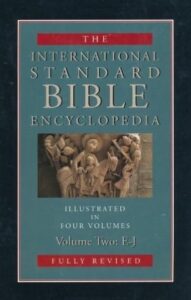
The International Standard Bible Encyclopedia, James Orr (Ed.), Chicago, USA, The Howard-Severance CompanyUSA, 1915:
1. Conception of Sin and Death: … Death, though come into the world through sin, is nevertheless at the same time a consequence of man’s physical and frail existence now; it could therefore be threatened as a punishment to man, because he was taken out of the ground and was made a living soul, of the earth earthy (Gen 2 7; 1 Cor 15 45.47). If he had remained obedient, he would not have returned to dust (Gen 3 19), but have pressed forward on the path of spiritual development (1 Cor 15 46.51); his return to dust was possible simply because he was made from dust (see Adam in the NT). Thus, although death is in this way a consequence of sin, yet a long life is felt to be a blessing and death a disaster and a judgment, above all when man is taken away in the bloom of his youth or the strength of his years. There is nothing strange, therefore, in the manner in which Scripture speaks about death; we all express ourselves daily in the same way, though we at the same time consider it as the wages of sin. Beneath the ordinary, everyday expressions about death lies the deep consciousness that it is unnatural and contrary to our innermost being.
2. The Meaning of Death: This is decidedly expressed in Scripture much more so even than among ourselves. For we are influenced always more or less by the Greek, Platonic idea, that the body dies, yet the soul is immortal. Such an idea is utterly contrary to the Israelite consciousness, and is nowhere found in the Old Testament. The whole man dies, when in death the spirit (Ps 146:4; Eccl 12:7), or soul (Gen 35:18; 2 Sam 1:9; 1 Ki 17:21; Jon 4:3), goes out of a man. Not only his body, but his soul also returns to a state of death and belongs to the nether-world; therefore the Old Testament can speak of a death of one’s soul (Gen 37:21 (Hebrew); Nu 23:10 m; Dt 22:21; Jdg 16:30; Job 36:14; Ps 78:50), and of defilement by coming in contact with a dead body (Lev 19:28; 21:11; 22:4; Nu 5:2; 6:6; 9:6; 19:10 ff; Dt 14:1; Hag 2:13). This death of man is not annihilation, however, but a deprivation of all that makes for life on earth. The Sheol (she’ol) is in contrast with the land of the living in every respect (Job 28:13; Prov 15:24; Ezek 26:20; 32:23); it is an abode of darkness and the shadow of death (Job 10:21,22; Ps 88:12; 143:3), a place of destruction, yea destruction itself (Job 26:6; 28:22; 31:12; Ps 88:11; Prov 27:20), without any order (Job 10:22), a land of rest, of silence, of oblivion (Job 3:13,17,18; Ps 94:17; 115:17), where God and man are no longer to be seen (Isa 38:11), God no longer praised or thanked (Ps 6:5; 115:17), His perfections no more acknowledged (Ps 88:10-13; Isa 38:18,19), His wonders not contemplated (Ps 88:12), where the dead are unconscious, do no more work, take no account of anything, possess no knowledge nor wisdom, neither have any more a portion in anything that is done under the sun (Eccl 9:5,6,10). The dead (“the Shades” the Revised Version, margin; compare article DECEASE) are asleep (Job 26:5; Prov 2:18; 9:18; 21:6; Ps 88:11; Isa 14:9), weakened (Isa 14:10) and without strength (Ps 88:4).
– Vol. II, pp. 811, 812.
IMMORTAL, i-môr’-tal, IMMORTALITY, im-or-tal’-i-ti (ἀθανασία, athanasia, 1Co 15:53; 1Ti 6:16, ἀφθαρσία, aphtharsia, literally, “incorruption,” Ro 2:7; 1Co 15:1-58; 2Ti 1:10, ἄφθαρτος, aphthartos, literally, “incorruptible,” Ro 1:23; 1Co 15:52; 1Ti 1:17):
1. Preliminary – Need of Definition and Distinction: In hardly any subject is it more necessary to be careful in the definition of terms and clear distinction of ideas, especially where the Biblical doctrine is concerned, than in this of “immortality.” By “immortality” is frequently meant simply the survival of the soul, or spiritual part of man, after bodily death. It is the assertion of the fact that death does not end all. The soul survives. This is commonly what is meant when we speak of “a future life,” “a future state,” “a hereafter.”
… Biblical Conception: It will be seen as we advance, that the Biblical view is different from all of these. The soul, indeed, survives the body; but this disembodied state is never viewed as one of complete “life.” For the Bible “immortality” is not merely the survival of the soul, the passing into “Sheol” or “Hades.” This is not, in itself considered, “life” or happiness. The “immortality” the Bible contemplates is an immortality of the whole person – body and soul together. It implies, therefore, deliverance from the state of death. It is not a condition simply of future existence, however prolonged, but a state of blessedness, due to redemption and the possession of the “eternal life” in the soul; it includes resurrection and perfected life in both soul and body. The subject must now be considered more particularly in its different aspects.
… II. The Biblical Doctrine – the OT.
1. Starting-Point – Man’s Relation to God: The Biblical view of immortality starts from man’s relation to God. Man, as made in the image of God (Ge 1:27), is fitted for the knowledge of God, for fellowship with Him. This implies that man is more than an animal; that he has a life which transcends time. In it already lies the pledge of immortality if man is obedient.
Man’s Nature. – With this corresponds the account given of man’s creation and original state. Man is a being composed of body and soul; both are integral parts of his personality. He was created for life, not for mortality. The warning, “In the day that thou eatest thereof thou shalt surely die” (Ge 2:17), implies that if man continued obedient he would live. But this is not an immortality of the soul only. It is a life in the body (compare Ge 3:22). Its type is such cases as Enoch and Elijah (Ge 5:24; 2Ki 2:11-12; compare Ps 49:15; 73:24).
2. Sin and Death: The frustration of this original destiny of man comes through sin. Sin entails death (see DEATH). Death in its physical aspect is a separation of soul and body – a breaking up of the unity of man’s personality. In one sense, therefore, it is the destruction of the immortality which was man’s original destiny. It does not, however, imply the extinction of the soul. That survives, but not in a state that can be called “life.” It passes into Sheol – the sad, gloomy abode of the dead, in which there is no joy, activity, knowledge of the affairs of earth, or (in the view of Nature) remembrance of God, or praise of His goodness (on this subject, and the Hebrew belief in the future state generally, see ESCHATOLOGY OF THE OLD TESTAMENT; DEATH; SHEOL). This is not future “life” – not “immortality.”
It is the part of grace and redemption to restore immortality in the true sense. Had the world been left to develop in sin, no further hope could have come to it. The picture of Sheol would have become ever darker as the idea of retribution grew stronger; it could never become brighter.
3. Grace and Redemption – the True Immortality: But God’s grace intervened: “Deliver him from going down to the pit, I have found a ransom” (Job 33:24). God’s mercy breaks in on the hopelessness of man’s lot. He gives to man His promises; makes His covenant with man; admits man to His fellowship (Ge 3:15; 4:4; 5:24; 6:8-9; 12:1-3; 15:1-21, etc.). In this fellowship the soul was raised again to its true life even on earth. But this held in it also a hope for the future. The promises placed in the forefront as tokens of God’s favors were indeed predominatingly temporal – promises for this life – but within these (the kernel within the shell) was the supreme possession of God Himself (Ps 4:6 f; Ps 16:2). This held in it the hope of redemption and the principle of every good.
Deliverance from Sheol. – Here we reach the core of the Old Testament hope of immortality. Such fellowship as the believer had with God could not be lost, even in Sheol; beyond that was deliverance from Sheol. In their highest moments it was this hope that sustained patriarchs, psalmists, prophets, in their outlook on the future. Doubt might cloud their minds; there might be seasons of darkness and even despair; but it was impossible in moments of strong faith to believe that God would ever really desert them. The eternal God was their dwelling-place; them were everlasting arms (De 33:27; compare Ps 90:1). Their hope of immortality, therefore, was, in principle, the hope not merely of an “immortality of the soul,” but likewise of resurrection – of complete deliverance from Sheol. Thus it is clearly in the impassioned outburst of Job (Ps 19:14; compare Ps 14:7 ff), and in many of the psalms. The hope always clothes itself in the form of complete deliverance from Sheol. Thus in Ps 17:14 f, the wicked have their portion “in this life,” but, “As for me, I shall behold thy face in righteousness; I shall be satisfied, when I awake, with thy likeness” (the American Standard Revised Version “with beholding thy form”); and in Ps 49:14 f, the wicked are “appointed as a flock for Sheol,” but “God will redeem my soul from the power of Sheol; for he will receive me” (same expression as that regarding Enoch, Ge 5:24; compare Ps 73:24). It will be remembered that when Jesus expounded the declaration, “I am the God of Abraham,” etc., it was as a pledge of resurrection (Mt 22:31 f). The idea comes to final expression in the declaration in Dan of a resurrection of the just and unjust (Mt 12:2). For further development and illustration see ESCHATOLOGY OF THE OLD TESTAMENT.
– Vol. III, pp. 1458-1460.
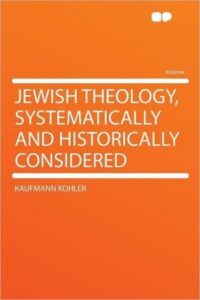
Jewish Theology: Systematically and Historically Considered, Kaufmann Kohler, 1918 (several republishings):
According to the Biblical view man consists of flesh (basar) and spirit (ruah). The term flesh is used impartially of all animals, hence the Biblical term “all flesh” includes both man and beast. The body becomes a living being by being penetrated with the “breath of life” (ruah hayim), at whose departure the living body turns at once into a lifeless clod. This breath of life is possessed by the animal as well as by man, as both of them breathe the air. Hence in ancient tongues “breath” and “soul” are used as synonyms, as the Hebrew nefesh and neshamah, the Latin anima and spiritus, the Greek pneuma and psyche. A different primitive belief connected the soul with the blood, noting that man or beast dies when the hot life-blood flows out of the body, so that we read in the Bible, “the blood is the soul.” In this the soul is identified with the life, while the word ruah, denoting the moving force of the air, is used more in the sense of spirit or soul as distinct from the body.
Thus both man and beast possess a soul, nefesh. The soul of man is merely distinguished by its richer endowment, its manifold faculties by which it is enabled to move forward to higher things. Thus the animal soul is bound for all time to its destined place, while the divine spirit in man makes him a free creative personality, self-conscious and god-like. For this reason the creation of man forms a special act in the account in Genesis. Both the plant and animal worlds rose at God’s bidding from the soil of mother earth, and the soul of the animal is limited in origin and goal by the earthly sphere. The creation of man inaugurates a new world. God is described as forming the body of man from the dust of the earth and then breathing His spirit into the lifeless frame, endowing it with both life and personality. The whole man, both body and soul, has thus the potentiality of a higher and nobler life.
Accordingly Scripture does not have a thorough-going dualism, of a carnal nature which is sinful and a spiritual nature which is pure. We are not told that man is composed of an impure earthly body and a pure heavenly soul, but instead that the whole of man is permeated by the spirit of God. Both body and soul are endowed with the power of continuous self-improvement. In order to see the great superiority of the Jewish view over the heathen one, we need only study the old Babylonian legend preserved by Berosus. In this the deity made man by mixing earth with some of its own life-blood, thus endowing the human soul with higher powers. In the Bible the difference between man and beast does not lie in the blood, although the blood is still thought to be the life. The distinction of man is in the spirit, ruah, which emanates from God and penetrates both body and soul, lifting the whole man into a higher realm and making him a free moral personality.
Still the Bible makes no clear distinction between the three terms, nefesh, neshamah, and ruah. Philo first distinguished between three different substances of the soul, but his theory was the Platonic one, for which he simply used the three Biblical names. The Jewish philosophers of the Middle Ages, beginning with Saadia, took the same attitude, even though they realized more or less that the division of the soul into three substances has no Scriptural warrant.
– pp. 212-214 (footnotes omitted).
“The first clear idea of the nature of the soul came with the philosophically trained [Jewish] thinkers, who were dependent either on Plato, main founder of the doctrine of the immortality of the soul, or on Aristotle, who ascribes immortality only to the creative spirit of God, the supreme Intelligence as a cosmic power. The nearest approach to Plato was Philo, who saw in the three Biblical names for the soul, nefesh, ruah, and neshama, the three souls of the Platonic system, — the sensuous soul, which has its seat in the abdomen; the courageous or emotional soul, situated in the breast; and the intelectual soul, which dwells in the brain and contains the imperishable divine nature. This last is kept in its physical environment as in a prison or a grave, and ever yearns for liberation and reunion with God. The soul of the righteous enters the world of angels after death; that of the wicked the world of demons.
Saadia, who was under the influence of Aristotle interpreted from the neo-Platonic viewpoint, did not share the Platonic dualism of matter and spirit, nor did he divide the soul into three parts, seated in various parts of the human body. He finds the soul to be a spiritual substance created simultaneously with the body, and uniting the three forces of the soul distinguished in Scripture into one inseparable whole, the seat of which is in the heart, — wherefore soul and heart are often synonymous in the Bible. This indivisible substance possesses a luminous nature like that of the spheres, but is simpler, finer, and purer than they, and endowed with the power of thought. It was created by God out of the primal ether from which He made the angels, simultaneously with the body and within it. By this union it was qualified to display that moral activity prescribed for it in the divine teaching, the neglect of which would defile and tarnish it. According to Saadia some kind of material substance adheres to the soul as well as to the angels, and on that account he does not hesitate to accept the Talmudic expressions about the abode of the soul after death, or the last judgment which is to take place as soon as the appointed number of souls shall have made their entrance into their earthly bodies, when the souls of the righteous will have their angelic nature recognized, and those of the wicked will have their lower character revealed. However, Saadia combats with so much greater fervor the Hindu teaching of metempsychosis, which had been adopted by Plato and Pythagoras.
Bahya connects his theory with the three souls of Plato, and likewise ascribes to the soul an ethereal essence. He holds that its destiny is to raise itself to the order of the angels through self-purification, and finally to return to God as the divine Source of light. To this end the intellectual soul, which has its being from the primal light, must overcome the lower sensuous soul which leads to sin.
The conception that the soul is a substance derived from the luminous primal matter, like the heavenly spheres and the angels, was now persistently retained by the Jewish thinkers, who explained thereby its immortality. In adopting the Aristotelian theory that the soul is the form-principle of the body, the Platonic doctrine of its preexistence was gradually relinquished, and its existence ascribed to a creative act of God at the birth of the child or at its conception. But Jehuda ha-Levi, the most pious of all the philosophers, emphasized vigorously the indivisibility of the soul, its incorporeality and its reality apart from the condition of the body, and — in opposition to the Aristotelian free-thinkers, who expected the human soul to be absorbed into the divine soul, the active intellect, — he declared the immortality of the individual a fundamental article of faith.Now some of the Jewish thinkers, following Jehuda ha Levi, Ibn Daud, and others, though Aristotelians, shrank from the logical conclusion of denying all individuality to the soul, and attributed to it rather a process of purification, which ends with the elevation of the soul-essence to angelic rank and thus guarantees its immortality. Not so Maimonides, who accepted with inexorable earnestness the Aristotelian idea of form as the perfection of matter. The essence of the human soul is, for him, that force or potentiality which qualifies it for the highest development of the intellect, and is alone capable of grasping the divine. Yet it can acquire a part in the creative World-spirit only in the same degree as it unfolds this potentiality to share the divine intellect, whose seat is the highest sphere of the universe. By dint of this acquired intelligence it can live on as an independent intellect, in the image of God, and thus attain beatitude in the contemplation of Divinity.
… Besides the philosophic doctrine of the immortality of the soul, however, the traditional belief in the resurrection of the body demanded some consideration on the part of these philosophers. Saadia defends the latter with all his might, endeavoring to reconcile the two as best he can. All the rest leave us in doubt whether resurrection is to be understood literally or symbolically. Maimonides especially involves himself in difficulties, inasmuch as in his commentary on the Mishna he considers the resurrection of the dead an unalterable article of faith, whereas in his Code and in the Moreh he speaks only of immortality; and again before the end of his life he wrote, obviously in self-defense, a work which seems to favor bodily resurrection, yet without clarifying his conceptions at any time. The belief in resurrection had taken too deep a root in the Jewish consciousness and had been too firmly established through the liturgy of the Synagogue for any philosopher to touch it without injuring the very foundations of faith.
– págs. 290-293 (footnotes omitted).
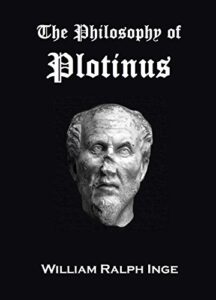
William Ralph Inge, The Philosophy of Plotinus: The Gifford Lectures at St. Andrews, 1917-1918, Longmans, Green and Co., London, Vol. 1, 1918 (This cover is from a Kindle Edition, with Volumes 1 and 2, 2014):
Those who sympathise with this anti-Hellenic movement are not likely to welcome my exhortations to read Plotinus. But if they would do so, they would understand better the real continuity between the old culture and the new religion, and they might realise the utter impossibility of excising Platonism from Christianity without tearing Christianity to pieces.
The Galilean Gospel, as it proceeded from the lips of Christ, was doubtless unaffected by Greek philosophy; it was essentially the consummation of the Jewish prophetic religion, but the Catholic Church from its very beginning was formed by a confluence of Jewish and Hellenic religious ideas, and it would not be wholly untrue to say that in religion as in other things Graecia capta ferum victorem cepit [Captive Greece conquered her savage victor]. Catholicism, as Troeltsch says, is the last creative achievement of classical culture. The civilisation of the Empire, on its moral and religious side, expired in giving birth to the Catholic Church, just as on the political side the Caesars of the West handed over their sceptre, not so much to the Holy Roman Emperors as to the priestly Caesar on the Vatican.
I regret that the scope of these lectures cannot be enlarged so as to include a survey of the development of Christian Platonism. Valuable books on the subject already exist; but none of them, so far as I know, treats this school of Christian thought as a continuation, under changed conditions, of the latest phase of Greek philosophy. The assumption is that the Christian religion may be traced from the Old Testament Scriptures, through the canonical books of the New Testament, and so to the Councils of the Catholic Church. This is like tracing a pedigree from one parent only, for the Hellenic element in the New Testament is usually almost ignored.
– pp. 13, 14.

Paul Althaus, Die letzten Dinge: Lehrbuch der Eschatologie, C. Bertelsmann Verlag, Gütersloh, Germany, 1922. (This cover is from Third Edition [1926]):
Der christliche Glaube weisz nichts von ‘Unsterblichkeit’ der Person — das hiesse ja das Sterben leugnen, es als Gericht Gottes verkennen — , sondern allein von Erweckung aus wirklichem Tode durch Gottes Macht: es gibt Existenz nach dem Tode nur durch Auferweckung, Auferstehung.
– p. 114.
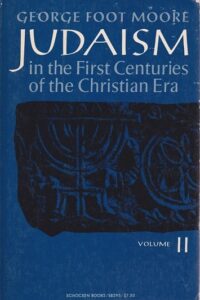
George Foot Moore, Judaism in the First Centuries of the Christian Era: The Age of the Tannaim, Oxford University Press, London, England, 1927, Vol. II (This cover is from 1971 edition).
Whether Greek ideas of the immortality of the soul and retribution after death — popular or philosophical — were widely entertained, or not, in a centre of Hellenic culture like Alexandria in the first century before the Christian era, it is certain that the development of conceptions of the hereafter in authentic Judaism went its own way unaffected by the alien influence.
The premises were totally different; on the one side the dualism of soul and body, on the other the unity of man, soul and body. To the one the final liberation of the soul from the body, its prison-house or sepulchre, was the very meaning and worth of immortality; to the other the reunion of soul and body to live again in the completeness of man’s nature. What to Philo would have seemed the greatest imaginable evil was to the Pharisees the highest conceivable good. The resurrection of the body, or, in their own phrase, the revivification of the dead, thus became a cardinal doctrine of Judaism.
– p. 295.
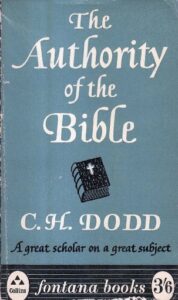
Charles Harold Dodd, The Authority of the Bible, Harper & Brothers Publishers, New York and London, 1929. (This cover is from 1978 Edition.):
The prophets know nothing of any life but the present. The troubles of the period after the Exile raised the question of a future life for the individual, while the influence of other religions with which the Jews now came into close touch suggested an answer. Judaism was, however, strangely slow to accept a doctrine of immortality in any sense, and it is only in the Greek period that the belief became current that those whom God deemed worthy would be raised from death by His power, to share in the blessings of the Age to Come. Only such a strongly Hellenized book as the Wisdom of Solomon inculcates anything like the Platonic doctrine of the immortality of the soul.
The New Testament is full of the assurance of everlasting life. There is indeed no discussion of immortality as a philosophical theory. Paul’s argument about the resurrection which we are accustomed to read at the burial of the dead [II Cor. xv. 12-58] is quite unconvincing if we suppose him to be attempting to prove the immortality of the soul. Actually that is not what he is talking about. His premises are those of contemporary Judaism: that a dead man really is dead and done for unless and until God makes him alive again by an act of creative power, and that this miracle will take place when the New Age dawns. On these premises, the fact that Jesus had been dead and was alive did afford a proof that the age of miracle had come, in which all whom God deemed worthy should receive from Him the supernatural life.
– pp. 217, 218.
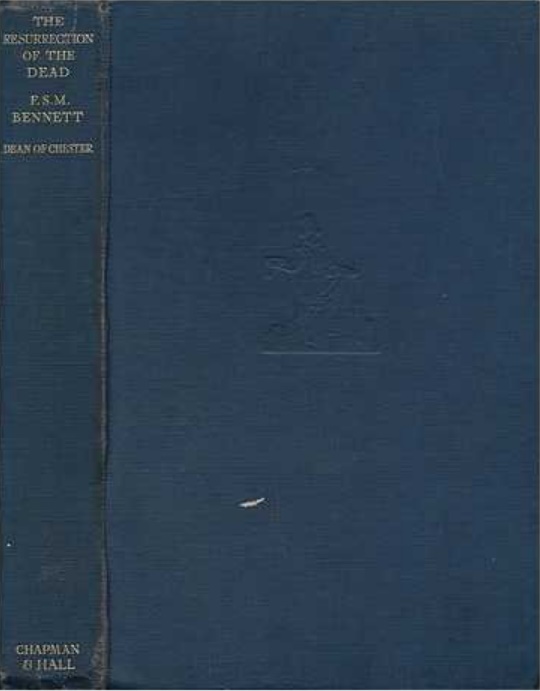
Frank Selwyn Macaulay Bennett, The Resurrection of the Dead, Chapman & Hall, London, England, 1929:
No doctrine of the natural immortality of the soul has a rightful place within the precinct of our Christian Faith. It is a philosophical doctrine and cannot claim to be part of revealed truth.
– p. 55.

James Moffatt, “ Hell,” Literary Digest, April 5, 1930.
Is the soul capable of reaching an immortal value, or is it immortal essentially? On the scheme of Christian faith, may it be annihilated? Is personality an undying possession, or is it attained through obedience to the creative will of God alone? The implications of the Christian view of faith are not incompatible with the latter, and it is, I think, a fair question whether the view commonly called Conditional Immortality may not gain corroboration in the future. It is contrary to Platonism, but there is not so much evidence against it in the message of Christianity as some appear to take for granted.
– p. 22.

James Alexander Findlay, “Is Immortality an Inalienable Possession of Man?” – The British Weekly, May 4, 1933:
The more closely I study my Bible, the more convinced I am that this is the substance of its teaching, and that the doctrine of conditional immortality thus understood is both entirely reasonable and consistent with the mercy as well as the justice of God. It gives a meaning to some of the sterner words of Jesus, which we are only too ready to explain away as merely figurative. Against all such sentimental dilutions of our Lord’s most solemn warnings I protest with all the force at my command: we must take them seriously. The ‘quenchless fire’ of which He so often speaks is not a tormenting, but a destructive, fire, and is a terrible reality.
– p. 84 (in a column called “The Correspondence of Prof. J. Alexander Findlay”).
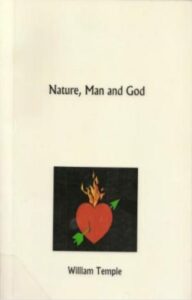
William Temple (1881-1944), the Archbishop of Canterbury and Primate of Great Britain. He wrote:
“(The) doctrine of the future life (will) involve our first disentangling the authentic teaching of the classical Scriptures from accretions which very quickly began to obscure this.”
“Man is not immortal by nature or right; but he is capable of immortality and there is offered to him resurrection from the dead and life eternal if he will receive it from God and on God’s terms.”
“Are there not, however, many passages which speak of the endless torment of the lost? No; as far as my knowledge goes, there is none at all.”
“After all, annihilation is an everlasting punishment though it is not unending torment.” Ibid.”
“One thing we can say with confidence: everlasting torment is to be ruled out. If men had not imported the Greek and unbiblical notion of the natural indestruction of the individual soul, and then read the New Testament with that already in their minds, they would have drawn from it a belief, not in everlasting torment, but in annihilation. It is the fire that is called aeonian, not the life cast into it.”
“How can there be the Paradise for any while there is Hell, conceived as unending torment, for some? Each supposedly damned soul was born into the world as a mother’s child, and Paradise cannot be Paradise for her if her child is in such a Hell.”
(Drew Lecture on Immortality, 1931; Nature, Man and God, 1953; Christian Faith and Life, 1931; 16th Edition, 1954; pp. 81, 454, 460 e 472).
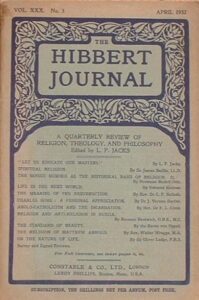
Walter Robert Matthews, “The Destiny of the Soul”, The Hibbert Journal, January of 1930:
The alternative view to the inherent immortality of the soul is some kind of conditional or conferred immortality. This view would appear to be most in harmony with the fundamental assumption of Theism, and as we shall see later, will probably best conform to what we may conceive to be the moral government of the universe. But the contrast usually drawn is that between immortality and the resurrection of the body. The latter doctrine, it has been frequently pointed out, is the characteristic feature of Christian teaching of the New Testament.
The old problem of the relation of mind and body has not indeed been solved, but it becomes clear that the sharp antithesis between them is not tenable. This does not mean that we are being insensibly carried towards materialism. Perhaps the tendency is really in the other direction. It does mean, however, that we are discovering that the distinction between mind and body is one which is made within the unity of the personal life and experience, which therefore includes what we mean by body as well as what we mean by mind.
The idea that eternal punishment of the wicked is somehow implied in the belief in the divine justice seems to me one of the strangest aberrations of the human mind, and the idea of Calvin that hell shows forth the glory of God by showing His justice, no less than Heaven by showing His mercy, one of the most horrible. Are we then led by our fundamental assumptions as Christian Theists to the conclusion of universalism? Must all souls in the end be saved? Many of us no doubt would rather err with Origen than be right with Augustine. But I do not think that either extreme is forced upon us by the thought of God on which we rest, indeed neither view seems to me to be really in harmony with it.
The Creator, when He brought into existence spirits with the power of self-determination, brought into being a sphere in which real risk and possibilities of disaster were present. It would surely be a puerile conception of God which would regard Him as allowing the game of freedom to go on for a time and then, like a parent who has had enough of the confusion, bringing it to a stop, giving everyone a present. Life is no game, and freedom involves real decisions. We must therefore hold to the Apostolic doctrine that the wages of sin is death.
– p. 199 fwd.
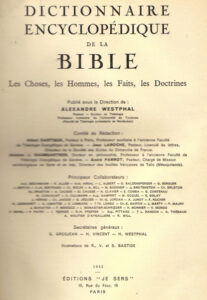
Dictionnaire Encyclopedique de la Bible, Valence, France; 1932-1935, edited by Alexandre Westphal:
Résurrection et immortalité.
Avant d’aborder l’étude biblique de la résurrection, il est nécessaire de distinguer la résurrection de l’immortalité; ces deux conceptions, qui l’une et l’autre expriment la même conviction d’une survivance après la mort, sont souvent confondues. Il s’agit là cependant de deux courants de pensée très différents; la notion de l’immortalité est un produit de l’esprit grec, tandis que l’espérance d’une résurrection appartient à la pensée juive. Il faut considérer ce que représentent ces deux conceptions et comment par la suite elles se sont pénétrées l’une l’autre.
1. LA RESURRECTION.
Idée juive, qui dérive de la conception juive de la personnalité humaine, dont le point de départ est l’affirmation de l’unité de cette personnalité. Pour l’Hébreu, le principe personnel de l’homme, son moi, ne réside pas dans l’esprit seul, mais dans le corps animé par le souffle de l’Éternel et devenant ainsi une âme vivante; (cf. Ge 2:7) cette âme est inséparable du corps, ce qui explique que l’A.T, désigne l’homme tantôt par le mot âme (Ps 16:10 35:3 49:16), tantôt par celui de chair (Esa 40:6, Vers. Syn., mortels; Jer 45:5, cf. Mt 16:17), sans que l’idée soit essentiellement différente.Quand donc l’Israélite affirme la survivance, il ne peut la comprendre que sous la forme d’une survivance de l’homme, corps et âme. Mais la corruption détruit le corps après la mort; l’Hébreu affirmera donc l’existence d’un nouveau corps venant prendre la place de ce corps détruit et dans lequel l’âme trouvera son appui nécessaire. Le corps ressuscité est conçu tantôt comme exactement pareil à celui que le mort a quitté, tantôt comme différent, comme um corps glorieux, spirituel. La résurrection marque ainsi la permanence de la personnalité tout entière, corps et âme. Elle représente la complète victoire sur le sépulcre (1Co 15:54 et suivant).
Cette conception juive d’une destruction du corps suivie d’une résurrection de ce corps soulève diverses questions. Quand aura lieu la résurrection? Est-ce à l’instant de la mort, est-ce au moment du jugement dernier, est-ce plus tard encore, à la consommation des âges? Et d’ici là, que devient l’âme, si la résurrection n’est pas immédiate? Est-elle plongée dans une inconscience semblable au sommeil, ou bien subit-elle déjà le sort que lui réserve le jugement final? Peut- lle encore se perfectionner?
2. L’IMMORTALITE.
Idée grecque qui dérive de la conception grecque de la personnalité. Pour les Grecs, la personnalité humaine est également composée de deux parties, le corps et l’âme; mais ces deux éléments, loin de former un tout harmonieux, s’opposent l’un à l’autre. Le corps n’est due matière et constitue une entrave dans la vie de l’âme, car celle-ci est pur esprit; or l’esprit, qui vit éternellement, se passe fort bien de l’aide du corps. L’âme, créée avant le corps, subsiste lorsque celui-ci est détruit, continuant à vivre de sa vie propre; car l’âme est immortelle et la mort du corps représente dans son existence une véritable délivrance qui la libère. Puisque l’âme est capable de vivre par elle-même, sans être obligée de s’appuyer sur aucun corps matériel, on ne s’étonnera pas de ce que la notion d’une résurrection des corps n’ait eu aucune place dans la pensée grecque.
3. INFLUENCE GRECQUE SUR LA PENSEE JUIVE ET CHRETIENNE.
A partir des conquêtes d’Alexandre, le judaïsme se pénétra lentement d’influences helléniques, principalement en Egypte, parmi les Juifs d’Alexandrie, dont la langue habituelle était le grec. D’autre part, comme l’affirmation d’une résurrection des corps et la croyance à l’immortalité de l’âme, bien qu’étant des conceptions différentes, n’en restent pas moins deux façons d’exprimer la même conviction d’une survivance après la mort, il n’est pas surprenant que ces idées se soient combinées au sein même du judaïsme. L’historien juif Josèphe assure même que l’idée d’une transmigration des âmes aurait été professée jusque dans les écoles des pharisiens. Quoi qu’il em soit de ce renseignement, la Sapience ou Sagesse de Salomon parle d’une préexistence de l’âme (Sag 8:20); Philon développe des théories très semblables, et la théologie du Talmud enseigne à son tour que les âmes, venues d’auprès de Dieu, sont en quelque sorte prêtées aux hommes, en qui elles habitent et dont elles se séparent après la mort.
C’est surtout lorsque le christianisme se fut détaché du judaïsme, qu’on en vint à mêler étroitement les notions de résurrection et d’immortalité; à la mort, affirma-t-on, le corps se décompose, ne ressuscitant que plus tard, et l’âme, détachée du corps et immortelle de nature, vit seule jusqu’au jour de la résurrection.
– Vol. 2, p. 557.
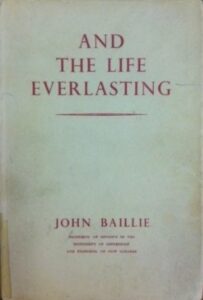
John Baillie, And the Life Everlasting, Charles Scribner’s Sons, New York, USA, 1933 and Oxford University Press, 1934:
“If we reject the [pagan] doctrine of eternal evil, then we have to choose between the alternatives of conditional survival and universal restoration. And this choice is likely to be determined by our judgment on a single issue. The conditionalist holds that complete annihilation is the natural fate of souls from which every trace of the divine image has been effaced, and it may be that in this the conditionalist is right.”
– pp. 244, 245.
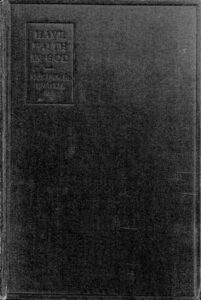
Norman Henry Snaith, Have Faith In God, The Epworth Press, London, England, 1935:
Death is not his shepherd, for God redeems his life (the Hebrew word is nephesh as also incidentally in Gen. ii, 7 not ‘soul’ as distinct from ‘body’ in the Greek sense, but rather the Hebrew idea of the thing that has life as distinct from the thing that has not life) from Sheol…
It is true that the Hebrews of early days spoke of Sheol, the abode of the spirits of the dead, but Sheol was essentially a dead world, a world without hope and without desire.
In death there is no remembrance of thee, In Sheol who can give thee thanks? (Ps. vi, 5.)
Or again, The dead praise not Jah, Neither any that go down into silence; But we will bless Jah From this time forth and for evermore. (Ps. cxv, 17 f.)
Or yet again, For Sheol cannot praise thee, death cannot celebrate thee; Those that go down into the pit cannot hope for thy truth. The living, the living, he shall praise thee, as I do this day. (Isa. xxxviii, 18 f.)
No passage shows more clearly than these verses from Hezekiah’s prayer in his mortal sickness the desperate intensity of the Hebrew in the face of death. All the praise he could ever give to the God of his fathers he must offer whilst yet he is in the land of the living. All the good he could ever see he must see this side the grave.
Man’s inevitable fate is at last to be consumed, and to vanish away like a cloud (Job vii, 9).
– pp. 15, 22.
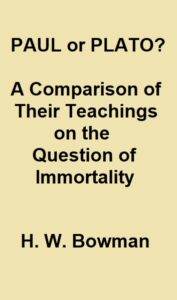
Hildamae Waltz Bowman, Paul or Plato? A Comparison of Their Teachings on the Question of Immortality,, CON, USA, The Herald of Life, 1937 (This is not the real cover of the tract.).
The great theological question now agitating modern Christendom is whether they will take Paul or Plato for a standard in settling the question of human destiny. Paul teaches that immortality is conditional; Plato, that it is unconditional. Pauline theology gives immortality on account of character, while Platonic philosophy gives it without character. The immortality that Plato teaches becomes a system of woe; that of Paul, one of happiness. Plato’s was speculation; Paul’s was Revelation.
Paul teaches that immortality is conferred on us by a resurrection; Plato, that we have it without a resurrection. Paul teaches that a resurrection from the dead is an absolute necessity in order to have future life; Plato teaches us that death liberates our immortal (?) souls, and gives us more freedom than we could have in the body. Plato teaches that the body is non-essential; Paul declares that unless it (the body) is raised from the dead, all who have fallen asleep in Christ have perished. Paul taught the revival of the dead; Plato taught the survival of the soul. Plato’s theory is a philosophic assumption; Paul’s, a divinely revealed fact.
Plato contradicted Bible writers; Paul agrees with them. Plato’s theory necessitates the change of plain statements of Scripture into figurative language; while Paul’s harmonizes with the entire Bible. Plato teaches that men are judged at death; Paul, that the executive judgment is at the second coming of Christ. Paul taught the gift of God was eternal life. Plato taught that we had it already. Paul teaches that we are to put on immortality at the resurrection; Plato teaches that we are to put off mortality at death. Paul teaches that death is an enemy; Plato teaches that it is a friend. Paul teaches that Christ brought immortality to light; Plato claims to have discovered it beforehand. Paul teaches that ‘the wages of sin is death;’ Plato teaches that the man can never die, no matter how much he sins.
Plato teaches that all men are naturally immortal and as incapable of dying as God himself. Paul teaches that the ‘first man was of the earth, earthy;’ Plato, that the real man is a spirit and not material. Plato taught that the body was a clog, a shackle, a prison house, and to be dropped at death; Paul taught that the body was for the Lord, a temple for the Holy Spirit, a subject of redemption, and to be raised from the dead in glory, honor, incorruptibility, and immortality. Plato taught that the soul was immortal, and could not die, could not perish, could not be destroyed and would exist forever; Paul taught that the whole man, soul and body, was mortal and corruptible, could die, could perish, could be destroyed, and, in agreement with St. John, that only ‘he that doeth the will of God abideth forever.’
– pp. 3-6.
